Features
Something witchy this way comes with Intuitive Shana
This real-life witch and lifelong mystic is bring the queer aesthetic to SoCal’s paranormal and spiritual world

Though brooms, black hats, and big cauldrons may sometimes play a role in the life of a witch, initiated priestess and lifelong mystic, Intuitive Shana lives the reality of a practicing witch in Southern California’s bustling life, where the paranormal and supernatural are just a moment away.
With the popularity of “Wicked,” the conception of who a witch is and the stigma surrounding the world of magic are changing.
Coming into her powers at a very early age, Shana blends ancient wisdom from her Hawaiian and Italian roots, with modern spiritual tools to dive into the magical world with a deeply personal touch. As much as she is in tune with the realities of Los Angeles life, she is as connected with the other side.
She helps people around the nation on Zoom and in person at The Green Man Store in Burbank connect with their spiritual side. Whether giving workshops, leading rituals, spearheading a ghost hunt, or reading tarot cards — she brings curiosity and reverence to every encounter with the unseen. Shana also hosts two podcasts; Wine, Spirits & Witches and Queer From The Other Side. She’s also often seen roaming around town (even at The Abbey), with her haunted doll, Stephanie.
We’ve hung out with Stephanie, and we can attest — yes, there is something supernatural there.
Shana will be joining our team of writers to give you a monthly rundown, using tarot and a hint of astrology to give us insight on what’s happening in the paranormal and spiritual realms as it relates to queer life in Southern California.
We chatted with Shana as she put the finishing touches on a spell and candle for a client.
How did you first come into contact with the paranormal or other side?
I grew up in a haunted house, so it’s more like the paranormal found me. It was very common to have little things go missing, like a book or a ball of yarn, and then they would show up in odd places like on top of the refrigerator, or on a shelf outside…but only after you asked the spirit in the home to give it back to you. You could look high and low, but if you didn’t ask the spirit for it, good luck!
This was my ancestral home, so the room I grew up in was actually the room that my mother grew up in as well. As far back as I can remember, my grandmother would tell me that there was a portal in my closet and that the ghost of a little boy lived there. Hearing things like that was something that was normal to me, and when you’re a child, you just accept these things as fact, especially if one of your grown-ups is telling you this.
What are the biggest misconceptions about being a real-life witch?
I really think that one of the biggest misconceptions about being a real-life witch is that we are miracle workers. I know a lot of people would think the biggest misconception is that we are all devil worshippers or have sold our souls to Satan, but I actually get that less and less these days! Now it’s, “Oh, you’re a witch? Can you make me famous? Can you curse my ex?” I know the idea of casting spells is appealing because it seems threateningly sexy and makes you think we can solve all of your life’s problems, but that’s not completely the case.
Spells and magic help twist and bend fate into a road that helps lead you in the direction you desire, or at least makes the road more manageable. But you still have to put in work to make things happen. What’s even more important, at least in my eyes, is the fact that witch or not, we are here living the human experience and that’s going to include things like heartbreak and struggle as well as the high points like love and success. We need all of these things to help shape us, magic can’t save you from character development!
How does your queer sensibility add to your intuitive powers?
I really think that my queer sensibility helped me hone in on my intuition and sharpen it from the very beginning. When we are children, we all have an intuitive inclination, but as we grow up, we start to shut it down, attributing a lot of it to imagination and telling ourselves magic, psychic powers, and ghosts aren’t real.
But it takes someone that is willing to reject the norms and challenge themselves to actually lean into and trust themselves and their authenticity to even consider that maybe it’s actually intuition over imagination. Being able to shift my own perspective and look at people, problems, and just the world in general from a queer lens has helped me embrace my intuition as the gift that it is, and become the reader and witch that I am today.
What do you love most about the witch/paranormal community in Los Angeles?
The Los Angeles pagan community is my home. I have found myself in it, grown into who I am, and made my chosen family and coven through it. It’s definitely grown and changed, especially since 2020, but I welcome all the new people into it and am happy to see this community growing and thriving.
While the pagan community and paranormal community can intertwine at times, in my opinion, they are two very different things. Aside from being with a group of ghost lovers, what I really love about the paranormal community is how diverse it really is. There are religious folks, atheists, pagans, and everything in between as far as brief systems. You also get the science geeks dipping their toes into divination tools, and woo-woo people using technology to align and give evidence to their psychic messages. A big melting pot coming together for one spooky reason. As with anything, there may be head-butting at times, but for the most part, people put those differences aside for their love of history and things that go bump in the night.
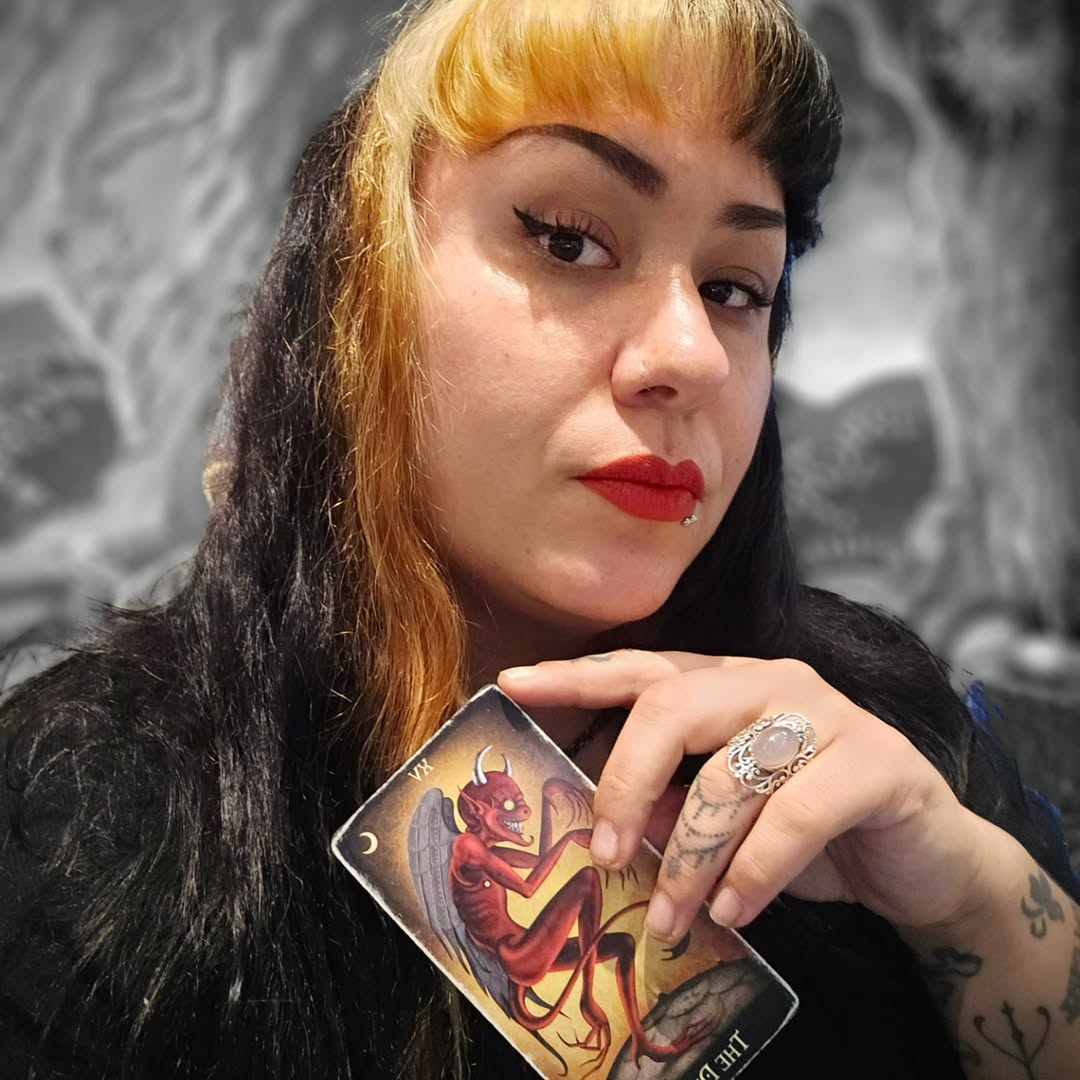
(Photo courtesy of Intuitive Shana)
You have led a series of ghost hunts. What has been one of your best experiences while conducting a ghost hunt?
I’ve been lucky enough to visit some very haunted places and artifacts all around the country, and I have seen and heard some crazy things with my ghost hunting equipment and I have even been a witness to psychic attacks and possession. But even with all of that, there is nothing quite like witnessing paranormal activity with your naked ears and eyes. It’s profound, thrilling, and sometimes terrifying.
The experience that always pops out is an investigation I was on that was closed to the public at an undisclosed women’s prison that is no longer in operation. It checked every box that makes you feel like you are in a horror movie. Peeling paint, sadistic and cryptic messages scrawled on the cell walls… the works. As I was in one of the cells, I heard another cell door not far away banging and banging.
At first, I thought it was a team member being loud, so I went out to snap at him and tell him we couldn’t hear a banshee over the noise he was making. But instead, I found an empty cell block. The banging didn’t stop, and I was able to find the door and set up some lights that would be triggered by vibration and movement.
It turns out that the doors were on an electric system and locked into an open position. The lights were never triggered, but the sound continued. That moment gave me an up-close experience of witnessing a residual haunting through sound. That sound would ring through the cell block every night. A memory staying alive through sound waves.
How can exploring our intuitive side help us in daily life?
Exploring our intuitive side helps us on a lot of levels. It’s kind of like working from the inside out. When you start to trust your intuition, it means that you start to trust yourself in a different and deeper way. This translates to our everyday life because your intuition and, therefore, spirit guides are giving you confidence and validation in your decisions, and that just helps give us an extra slice of peace in regards to the life we are choosing to live.
Being tuned in to what your spirits are saying helps you get a proper read on a person or situation, and we all know that it is always beneficial to be the vibe check queen. Listen to your dreams, your tarot cards, and that primal gut feeling you get. It is never there to steer you wrong.
There is so much turmoil for the queer community right now – politically and socially. How can we get through this tough time spiritually?
The world is a very strange place these days, and we are all feeling the effects of it trickling down and bringing us down as individuals and as a community. This is a time that we can really lean into our spirituality to find inner strength and encourage ourselves to continue doing the inner work to heal and grow. A lot of times, when we do this, it starts as a solo act, and we begin to attract people who are on the same wavelength, and that creates a new sense of community, inspiration, and safety. We must remember that there is strength in numbers.
Now, more than ever, I encourage people to honor and communicate with their ancestors. And when I say ancestors, I am not just talking about blood relatives, even though your mom or grandfather could be an excellent source of power for you. I am talking about past pillars of the community, people who led the revolution, or people who preached love and authenticity and practiced what they preached.
When we honor spirits and give them a space to connect with us, through things like dreams or meditation, they come to us with messages and words, or encouragement. If you don’t believe in spirit communication or think you lack that ability, you can at the very least use this practice to help you shape shift and lean into embodying these archetypes.
Many from the queer community have not had the best relationship with religion. How does being spiritual and connecting with the paranormal differ from being religious?
Religion teaches us to fit inside a box and follow rules. If who you are as a person doesn’t fit nicely into this box, you are shunned, and faced with things like the idea of going to Hell. Spirituality isn’t one size fits all. When I began really studying different belief systems and turning to paganism, the most enticing part of it was the fact that I had the freedom to not only be who I am and be accepted and celebrated for it, but I was also given the freedom to worship and work with any deity that spoke to me.
There was no right or wrong to it. Only what was right for my spirit in that moment. When we are able to look at faith and spirituality as something that is uplifting and blessing us with divine strength instead of something that is condemning us, we open up a whole new world of possibilities that can provide satisfaction to our souls.
You host Queer from the Other Side podcast, who has been one of your favorites guests and what did you learn from them?
We have seen some fascinating guests on Queer from the Other Side! It’s hard to pick a favorite because everyone was so different, but I’d have to say that out of all of the season 1 guests, Nick Brown was my favorite. Nick is an Egyptologist who came on the show and spoke to us about Egypt. It was really informative to hear about his experience as a queer person in Egypt, especially since we all know how controversial and dangerous it can be over there for anyone in the queer community.
I also loved that Nick has a very mundane and grounded point of view when it comes to ancient aliens and Egyptian deities. The conversation stayed informative and nonjudgmental even though we were speaking to him about some of the more “woo woo” theories and beliefs surrounding ancient Egypt.
How do you balance your everyday life and your intuitive life?
Because my 9 to 5 is literally being a witch and spiritual consultant, my everyday life is very blended with my intuitive life. I have learned to create space in my life, both professional and personal, so that my intuition is allowed to flow in and help guide me. Even when its not in big ways like a reading or through ritual, my spirit guides speak up and give me messages or what I call “hits” about things, like when to pay attention to my dog because they are being low key but actually need to go to the vet, or to bring a special piece of equipment with me to work that I normally don’t take with me.
It’s like a fine-tuned gut feeling. I bet if you paid attention, you have it too. Sometimes it’s just subtle.
As with all things, balance is key. Too much freedom to let your intuition and spirit run wild is like drinking too many martinis. It starts out fun, but we both know it’s going to get messy soon enough. Back to the human experience I talked about earlier, we are here on Earth. We have bills to pay, jobs to hold down, and relationships we need to show up for. If you let your spiritual side run the show, these things start to fall apart. So while having a fine-tuned intuition is important to me, it’s equally important that I know when to shut it down and show up as a mundane, regular adult.
You are going to be doing tarot monthly kickoffs for the Los Angeles Blade audience. What will readers walk away with from reading your new column?
I am so excited for the opportunity to start sharing some otherworldly insight with the Los Angeles Blade readers! I’m going to be doing a monthly tarot forecast to help give people a look at the major energies that are going to be sitting with us for the month ahead. This is going to act as a guide to help everyone know when to avoid drama, push harder on their projects, give their love life special attention, or just relax and let life happen. I am going to make sure to note what to expect and how to navigate things if the month has planetary retrogrades (like when Mercury gets spicy and goes into retrograde). And hello, I’m a witch. That means that I will also be dropping bits and pieces of magical knowledge and even suggesting that readers carry a certain crystal or do a particular spell if the month calls for it. Stay tuned, my witchlings!
What is your message to the queer community?
My message for the queer community is to love and honor yourself through both your material life and your spiritual life. Lean on your spirituality, your magic, your spirit guides, and your ancestors.
Follow Intuitive Shana on IG.
Features
What’s next for “local hero” and longtime queer ally Genevieve Morrill
Morrill served 15 defining years on WeHo’s Chamber of Commerce. We discuss her future and how queer advocacy can’t be ignored in her legacy.
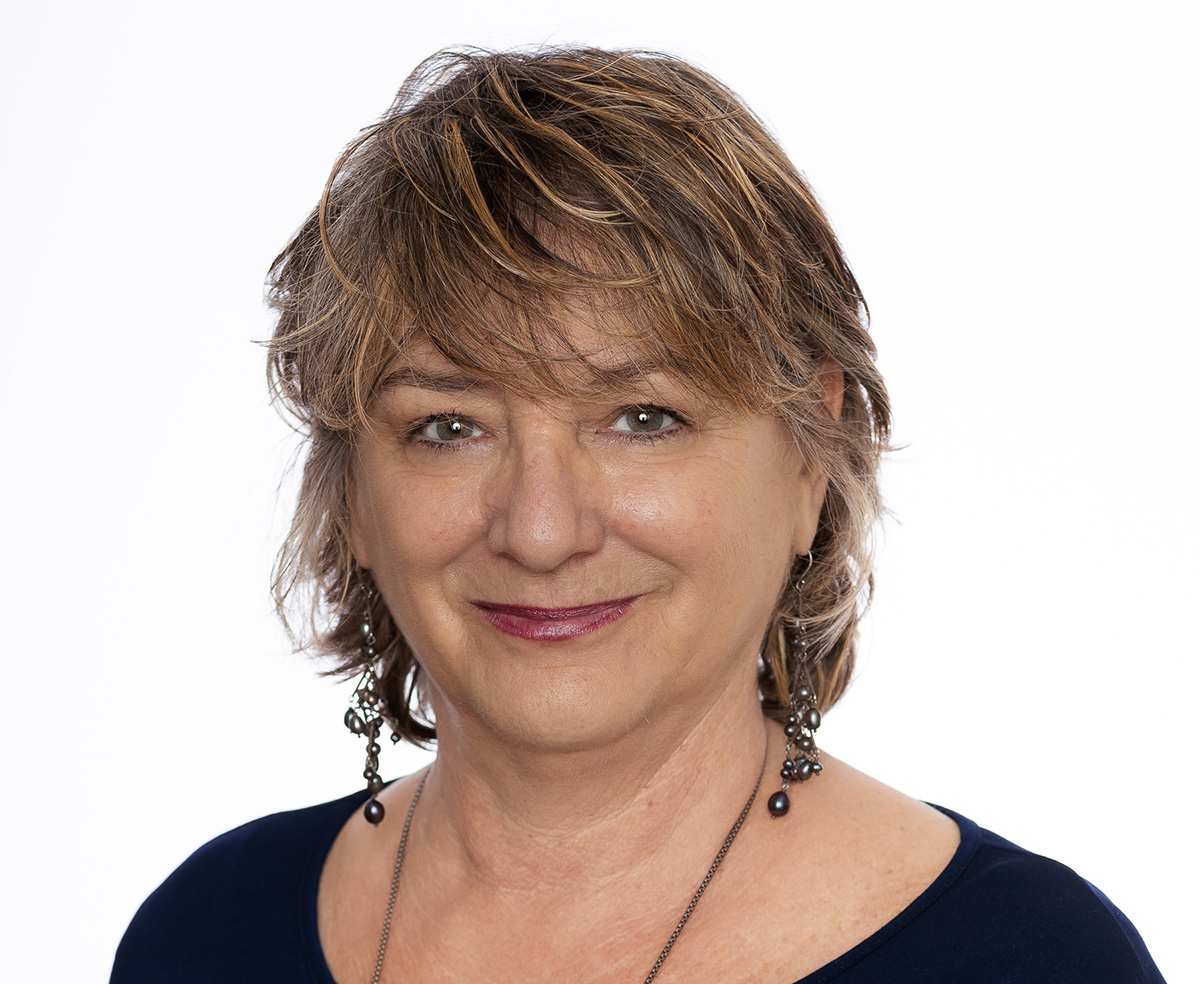
It’s Feb. 4 when I sit down to call Genevieve Morrill, only a week after she officially stepped away from her longtime role as president and CEO of West Hollywood’s Chamber of Commerce. For 15 years, she paved the way for the City’s business ecosystem: creating robust opportunities for business owners and championing their rights.
Her leadership style has always been defined by forward-thinking, ambitious, and collectively-driven change. “I’m not here to tell you how to lead,” Morrill told the Blade. “I’m here to lead with you.” This focus on inclusivity and community empowerment stretched into advocacy for marginalized community members. From early on, Morrill has been a strong ally for BIPOC and LGBTQ+ people, creating pathways for diverse leaders and business owners.
Today, we dive into Morrill’s legacy of queer advocacy: one that has earned her this year’s “Local Hero” award at the upcoming Los Angeles Blade’s Best of LA Awards on Mar. 26.
Uplifting queer and trans people in the business sector
In West Hollywood, and Los Angeles more broadly, Morrill is known for her dedication to shaping and revitalizing dormant spaces. The Chamber was “in trouble” when the board asked her to take over leadership in 2010. They were struggling under the pressure of the recession, and the next steps looked risky and obfuscated. Morrill readily accepted the challenge, her internal armor strengthened by a childhood that was always on the move.
Morrill’s father was a Methodist minister and would often move the family around to take part in “community development work” across the globe. She felt propelled by a sense of duty and mission from a young age. “It’s kind of in my DNA… [I grew up] in an organization that was focused on caring for the world,” Morrill said, who also attributed her strong sense of justice and community-oriented service to her parents’ involvement in civil rights and the women’s movement.
Her responsibility to the people led to major reforms at the Chamber of Commerce: the board tripled its budget, increased membership by 20%, and created widespread visibility for small businesses across West Hollywood. Under her guidance, the Chamber also established a small business task force as well as its philanthropic Small Business Foundation: an organization dedicated to expanding opportunities and providing training for queer and BIPOC business owners, as well as other minority community members.
This all sprouted from Morrill’s keen eye: while immersing herself deeply in the beast of WeHo’s business ecosystem, she observed the lack of initiative employers would take when it came to hiring and empowering trans and queer workers. She began collaborating with Drian Juarez, then the vice president of programming at Trans Can Work: a local workforce development organization that supports transgender and gender nonconforming people.
In the early 2010s, Morrill and Juarez hosted their first seminar together, where fewer than 10 people attended. “It was a real challenge to get people there,” Morrill said, who explained to the Blade that, even a decade ago, business owners were hesitant to adapt queer inclusivity into their branding. Queer stigma continued to be rampant and widespread.
Morrill refused to accept this. For the next seminar focused on trans people in the workplace, she called various local businesses and pushed them to attend. “You need to get there,” she recounted, remembering that her tone was urgent and stern. Over 50 people attended this second seminar. She recalls this early foray into queer advocacy as one of her many “significant” achievements.
These workshops then formed into a steady program: WeLead Academy, a professional development opportunity that uplifts queer and BIPOC entrepreneurs. Over two months, participants learn about money management, leveraging technological advancement for business growth, collaborating within the community, navigating government systems, and other essential business skills. It is powered through the Chamber’s Small Business Foundation.
In her years of service to West Hollywood, Morrill set a precedent for this expansion of inclusivity: to ensure that the City’s wide, varied fabric of people felt represented and capable of unlocking success. Morrill also recognizes that the spaces around us are ever-changing, and rather than stay locked in old ways, she questions: how can we preserve the spirit and histories of our environment, while allowing for growth that takes us to a more equitable future?
She reflects on older conversations she had with the late LGBTQ+ rights activist Ivy Bottini, where they would often discuss the loss of lesbian and sapphic sanctuaries. Even within queer spaces, there is still a need to constantly recalibrate and think about who we’re leaving out of the conversation. But Morrill thinks about these dilemmas with hope and continues to stand in solidarity with the queer communities “being attacked and trying to be erased” right now.
What’s next for Morrill?
This new chapter ahead is marked by bittersweet excitement. On leaving the Chamber, Morrill explained that, as hard as it is to “break off” from these 15 memorable years and the space that defined her community work, it’s a necessary change.
This has been her whole life, up until now. “[When I] was asked if I was still going to leave at the end of 2025, my heart said no,” Morrill said. “But out of my mouth came: yes. I think my heart is still here in West Hollywood [and] with all the businesses…I know there’s still a need for somebody to defend and fight for them.” Morrill’s successor is Len Lanzi, whom Morrill trusts will lead the Chamber well in its next era.
A return to the arts?
When I ask Morrill what the future looks like ahead, she is unsure but excitedly brings up an old passion project: a nonprofit she started in 2007, called “Books with Feet.” The concept is rooted in her core love for theater, books, and the arts: classic short stories are performed so that every single word, even in narration, is performed with exciting and dynamic movement.
Here, Morrill directed stories on the stage: a place she found success in during her adolescence. She recounts performing in a hit show in Chicago and giving it her all during its 14-week run. She studied under acting legends in the 1980s, before beginning to coach students herself.
“I think what happened for me was I didn’t really have a desire to hit the pavement with my headshot,” Morrill said. “But I had a desire to continue to be immersed in the arts.” So she ran Books with Feet until 2011, when it became impossible to manage both this and her Chamber role. “So, I might get back to that. Who knows?” Morrill said.
As we talk more, her entrepreneurial, innovative spirit springs forward, ripe with possibility. She discusses the possibility of creating cultural hubs across the county, revamping “dumpy” abandoned theaters and transforming them into lively arts districts of their own. “I feel like the strings have been cut,” Morrill said, of this new liberating freedom she feels for her path ahead. “As that happens, more space will open up for me [and] that will help me understand what the universe is going to present to me.”
Celebrate Morrill with the Blade at our upcoming Best of LA Awards on Mar. 26, held at the Abbey in West Hollywood. More information can be found here.
Kristie Song is a California Local News Fellow placed with the Los Angeles Blade. The California Local News Fellowship is a state-funded initiative to support and strengthen local news reporting. Learn more about it at fellowships.journalism.berkeley.edu/cafellows.
Features
From the Desk of AJSOCAL: How the QTAPI community celebrates Lunar New Year
Our queer and trans Asian Pacific Islander siblings are celebrating the new year on Feb. 17, channeling chosen family, new traditions and the transformative power of the Fire Horse. Read how various local advocates are finding power and community in this time.
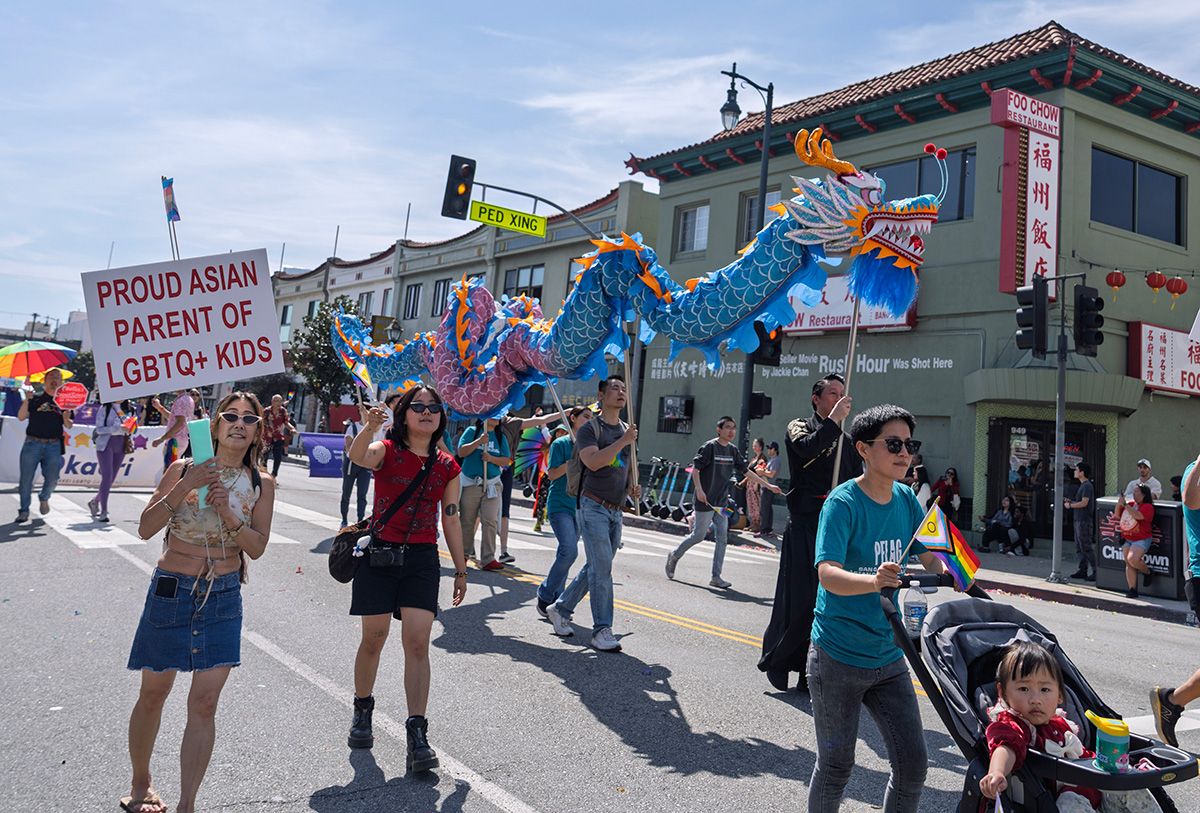
For many, the New Year starts on January 1st, but for some in the queer and trans Asian Pacific Islander (QTAPI) community, the new year begins in the middle of February. For many in the larger AAPI community, celebrations of the Lunar New Year mark the start of spring, bringing families together through reconnection, traditions, and shared meals.
Lunar New Year is a time when folks usually celebrate with family, but as LGBTQ+ folks, many of us have found a home or a safe space with our chosen families instead. As a result, we include traditions that are inherently “QTAPI,” blending our LGBTQ+ identities and our AAPI heritage. Today, we are highlighting a few diverse community leaders from our QTAPI community and how they are planning to celebrate the Year of the Fire Horse later this month.
For Chinese astrology enthusiasts, the last Year of the Fire Horse was observed in 1966, marking a generational return of passionate, expansive possibility and intense reconstruction and manifestation in 2026. If there’s a year to be brave and be intentional, the time is now – it’s not in the face of an oppressive government trying to deprive us of our futures.
Civil rights organization Asian Americans Advancing Justice Southern California (AJSOCAL) spoke with various QTAPI community leaders and allies about how they celebrate and renew the Lunar New Year through a queer and trans lens.
Viki Goto is the Board co-president of PFLAG San Gabriel Valley API Chapter, an organization that supports AAPI families with LGBTQ+ children.
Kay P. is a parent involved with PFLAG San Gabriel Valley API Chapter.
Maria Do is the Community Mobilization Manager for the Los Angeles LGBT Center.
Kathy Khommarath is the Institutional Giving Manager at AJSOCAL.
Marshall Wong previously served as the principal author of Los Angeles County’s Human Relations Commission’s annual hate crime report, and spearheaded the queer and trans AAPI organization API Equality-LA, which was rebranded as Moonbow before its disbandment in 2025.
What does Lunar New Year mean to you?
Goto: Lunar New Year was always about eating good food for me. [But] once I learned more about the traditions and the history behind them, I realized that the Lunar New Year’s importance has expanded as a representation of Asian cultural heritage. As more communities across Southern California host festivals, parades, and educational events, a greater sense of belonging and appreciation for our unique stories is fostered among people with different cultural backgrounds. This is vital to creating an inclusive and affirming society where everyone is encouraged to be their authentic selves.P.: Growing up in a mostly white community in the Philadelphia suburbs, I didn’t know about Lunar New Year. It really wasn’t until I moved to California and saw that it was celebrated in my children’s schools that I felt that it was a real holiday, and it felt good to be represented. [It’s] a recognition of me and my Asian American community.
Do: Lunar New Year is traditionally a holiday spent with family. For me, this includes chosen family. While the turn of a new calendar year is often viewed as a time for personal reflection and goal setting, the Lunar New Year offers a chance to set those intentions with one’s community. It’s a celebration that is deeply hopeful, which is why I always look forward to it every year.
Khommarath: While I don’t personally celebrate Lunar New Year because I am Lao American, I deeply respect the holiday and the way many Asian communities mark it as a time of renewal and connection. In Lao culture, our major new year celebration is Pi Mai, or Lao New Year, which takes place in April. Even though the timing and customs differ, the spirit behind Lunar New Year feels intimately familiar. Both Lunar New Year and Lao New Year are centered on renewal, community, cleansing away the past year, and entering the new one with intention and joy.
Wong: The Lunar New Year is the most important celebration for two billion Chinese, Korean, Vietnamese people, and many other communities worldwide. It is a time for families and friends to come together to wish one another luck, prosperity, and progress in the coming year. Growing up, it was a time for beloved traditions, like parades, lion dances, firecrackers, special foods, and red envelopes containing lucky money for children. For many people, it involves rituals of ancestral worship, deep cleaning of homes to signify new beginnings, displaying decorations, and wearing special clothes.
How do you celebrate your QTAPI identity?
Goto: As part of the PFLAG San Gabriel Valley Asian Pacific Islander chapter, I’ve marched in the Golden Dragon Parade for the last several years in Chinatown as part of the Asian Pacific Islander Rainbow Coalition (ARC) contingent. ARC is a group of API LGBTQ-serving organizations that work to advance LGBTQ+ equality in the Asian Pacific Islander community and to support our LGBTQ+ friends and families through education, community organizing, and advocacy.
We have been so fortunate to help carry VROC’s (Viet Rainbow of Orange County) rainbow- and TGI-colored dragons in the parade. It’s an amazing feeling to see the faces of people in the crowd light up as we pass by and to hear them cheering and popping firecrackers. We frequently have people run into the street to take a picture with us. One of our founding PFLAG members is a crowd favorite with his “I Love My Gay Son” sign!
P.: We attend monthly API PFLAG meetings and visit with our community there.
Do: This year, I am honored to be helping co-produce HOTPOT’s Lunar New Year special event, Year of the Horse, with my dear friend and HOTPOT’s founder, Jordyn Sun. It will take place on Friday, February 20, at Apt 503. I will be one of the hosts, so feel free to stop by, say hi, and celebrate with us!
I will also be joining VietROC for their Tết festival in Orange County on February 13 and marching with the entire collective of QTAPI orgs at the Golden Dragon parade on February 21.
That said, every day is technically a celebration as a person existing at the intersection of being queer and Asian. Finding and welcoming other people in the queer Asian diaspora here in Southern California has helped me become more proud of who I am and where I belong!
Khommarath: Although I’m bisexual, I often move through the world as straight-passing because my spouse is a cis man and we’re raising our three visibly cis boys (as far as we know for now?). That visibility gap has pushed me to be intentional about how I honor my QTAPI identity — not just privately, but in ways that stay connected to community, culture, and the experiences that helped me understand who I am.
In fact, I didn’t fully embrace my bisexual identity until I started working as a community organizer at API Equality-LA. I had just graduated from LMU and was suddenly surrounded by queer and trans API individuals, leaders, and organizers who created a space where I felt safe, seen, and able to name parts of myself I had never had the language or community support to articulate. Being in that environment, being held by people who lived their truths so openly, helped me embrace mine. Those years were foundational. They shaped not only my politics and career but also my understanding of self, belonging, and pride.
Becoming a parent changed how I could show up in those spaces. I had to step back from the day-to-day organizing and intense participation to focus on the kiddos. But I’ve worked to make sure my QTAPI identity doesn’t fade just because my life looks “straight” from the outside. I celebrate in ways that fit the life I have now.
A lot of those celebrations look like family-centered rituals that connect my children to queer Asian American community spaces. For example, I’ve taken them (and intend to take them this year!) to the Golden Dragon Parade during Los Angeles Chinatown’s Lunar New Year celebration. These events include queer API groups marching or organizing, and being there with my children feels like bringing together the multiple communities that raised me and my identity. It’s a way of showing them that our cultures are vibrant and diverse, and that queer stories are part of our family’s and community’s fabric.
So, while I’m not celebrating in the same ways I did when I was younger (e.g., late-night meetings, rallies, coalition convenings, organizing 1:1 conversations, marches), I continue to celebrate my QTAPI identity through community events, storytelling, and the values that shaped me. I’m raising my children to understand, honor, and take pride in that part of me, too.
Wong: In 2006, a brand-new organization, API Equality-LA, mobilized the first LGBTQ+ contingent in the annual Lunar New Year parade in Los Angeles Chinatown. Over the years, our group grew into the largest contingent in the parade, drawing as many as 200 participants. This occurred against the backdrop of the fight for marriage equality and was a powerful symbol of growing support for LGBTQ+ visibility, inclusion, and civil rights in the API community. The annual tradition ended in 2021 because of the pandemic, and we have only revived our contingent during the past two years.
On a more personal note, over the years, I have hosted numerous birthday/theater parties at the East West Players, the largest and longest-running Asian American Theater in the nation, and a space that has nurtured many Asian LGBTQ+ performers, writers, directors and other artists.
How do you celebrate with your chosen family and/or your community?
Goto: The members of PFLAG SGV API are my chosen family and we usually pass out lucky red envelopes at our monthly support meeting prior to the Lunar New Year. We also table at as many festivals as we can to ensure our visibility in the API community and to distribute educational information, such as affirming language that families can use when their child shares their identity with them. We want to be a culturally respectful resource and provide non-judgmental support in a comfortable environment to API folks, no matter where they are along their journey.
P.: We enjoy food (often dim sum!) with our family and friends.
Do: I celebrate with my community and chosen family by getting politically engaged. Given fascism’s rise, it is crucial now more than ever to not only express our joy with chosen family as a form of resistance but to use that joy to fuel our community-building efforts. Whether that is organizing donations for mutual aid, sharing legal resources for our neighbors and friends, volunteering at a food distribution, or educating folks on how to take direct action, I see our collective efforts as a celebration in itself.
Wong: For most of my life, I would look forward to celebrating the Lunar New Year over a Chinese banquet with my family. Now that most members of my birth family have passed on, I have been gathering each year for a special meal with other API LGBTQ+ activists and allies. Coming together has been especially important given recent events (COVID, spikes in anti-Asian violence, horrific fires, ICE raids and attacks on trans rights) that have caused so much anxiety and suffering.
What are you hopeful for in the upcoming year of the Fire Horse?
Goto: I am hopeful that the beloved community coalitions that have come together over the last few years will continue to grow, gain momentum, and change the world!
P.: I hope for drastic change in the current trend toward negative legislation against trans persons. Trans people are just living their lives like the rest of us. Just because some are uncomfortable around them is not a reason to interfere with their lives. Rather, we should be getting to know those who are different and understanding each other better.
Do: Currently, I am working as the Community Mobilization Manager at the LA LGBT Center. I help activate community members to participate in a variety of actions ranging from phone banks to postcard actions, from door-to-door GOTV canvassing to legislative visits, and from rallying in the streets to making public comments with city and county officials.
The purpose of mobilizing is to make our voices heard, express urgency around a variety of LGBTQ+ issues, and spark transformative change. In our tumultuous present, I am hopeful that this year will give me the confidence to fuse my experience in organizing within LGBTQ+ spaces and my interests in other spaces that more directly address the wealth, equity, and access concerns of our broader community. In other words, I am hoping to harness the Fire Horse energy to strengthen existing and nascent solidarities across Los Angeles.
Khommarath: With the Fire Horse symbolizing bold movement, passion, and transformation, I’m hopeful for a year where I embrace more intentional risk-taking — not the reckless kind, but the kind that clears space for growth. I’ve spent so much of my adult life balancing responsibility, care, and community, and this year, I want to make room for creativity, curiosity, and the type of ambition that feels aligned rather than overwhelming.
I’m looking forward to exploring new ways of showing up in my communities and for my family and allowing myself to pursue things that energize me instead of defaulting to what feels safest or most expected. If the Fire Hose encourages anything, it’s to trust momentum when it arrives.
Immigrant communities, LGBTQ+ individuals, and communities of color are facing instability, fear, and targeted harm right now. It feels like every week brings another policy change, wave of rhetoric, or reminder of how urgently our communities need and deserve safety and dignity.
I’m hopeful for the capacity to stay GROUNDED — to remain connected to community struggles while being fully present with my children, modeling courage without losing softness. If the Fire Horse urges us toward boldness, then my hope is the channel that boldness into clarity and choosing when to act, when to rest, and how to hold both responsibility and joy at the same time.
Wong: As justice-loving people, it is easy to become paralyzed with anxiety and hopelessness given the enormity of the challenges we face today. But we have to remember: It is always darkest before the dawn. Courage does not mean lack of fear. It means acting decisively in spite of fear. May we find strength and comfort through collective action in the Year of the Horse.
Read more about each advocate and community worker by clicking the links above, and join them as they march at the upcoming 127th annual Golden Dragon Parade on Saturday, Feb. 21 from 1-4 p.m. in Los Angeles Chinatown. The Blade will be joining AJSOCAL on the route.
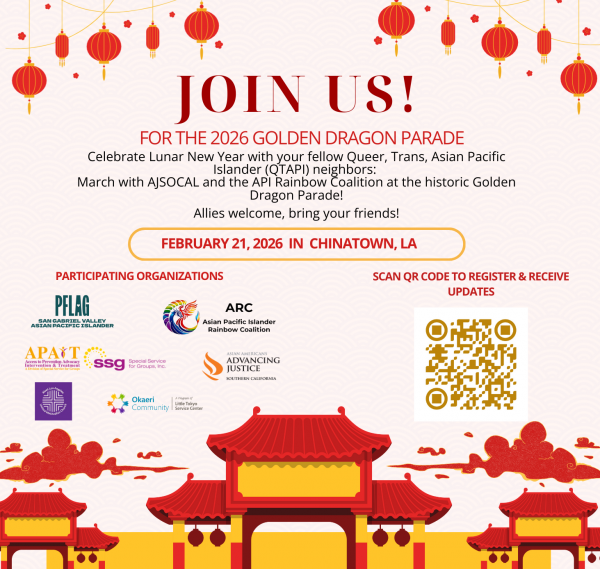
Jeffrey Deguia, LA Regional Policy Advocate at Asian Americans Advancing Justice SoCal, with contributions from LA Blade reporter Kristie Song, has curated this article.
Kristie Song is a California Local News Fellow placed with the Los Angeles Blade. The California Local News Fellowship is a state-funded initiative to support and strengthen local news reporting. Learn more about it at fellowships.journalism.berkeley.edu/cafellows.
Features
LGBTQ+ legal hero Jon Davidson hands civil rights torch to new generation
Davidson shares successful AIDS, GSA, and Asylum cases. As well as being in a polyamorous relationship.
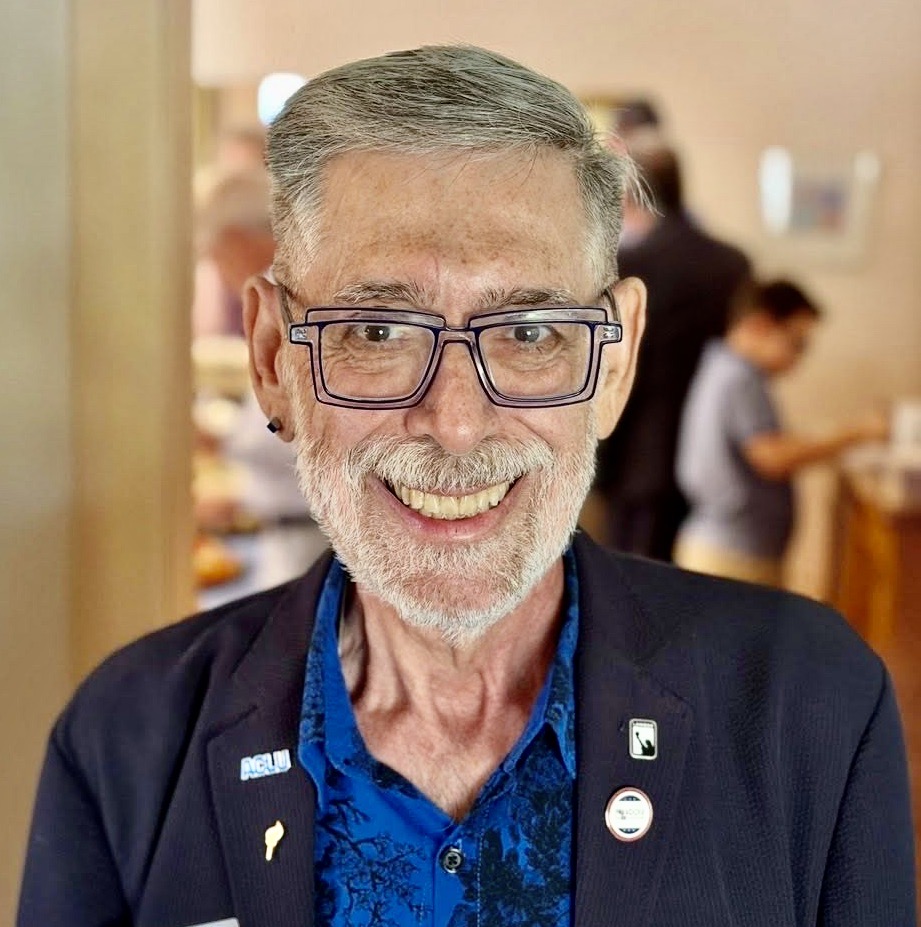
There are heroes among us in this violent struggle against the demented but planned tyranny of Donald Trump. In cities large and small and rural regions across America, including Los Angeles, “We the People” are standing up, walking out, marching, holding signs, and blowing whistles to bravely fight for our neighbors, our freedom, the US Constitution, and plain old fairness and human decency.
But for some of us, that fight has been existential for decades – as illustrated through the LGBTQ+ and other Smithsonian Institution historical exhibits Trump wants to hide and erase to make America way more White Supremacist again. (Please see this video to better understand our history and Trump’s promise to “decisively win the culture wars.”)
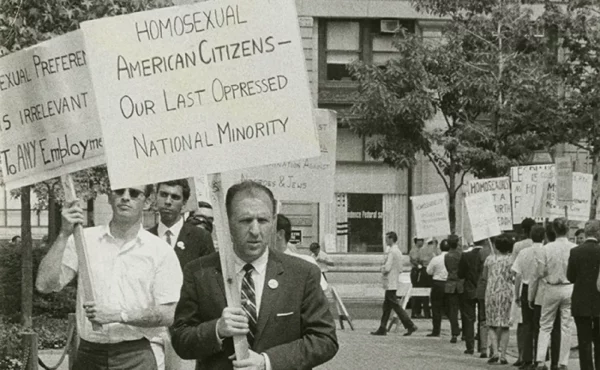
That’s why it feels like such a loss when a hero leaves or steps back, even for the most logical and human reasons.
Gay attorney Jon Davidson has been such a hero, a leader among the brightest of our warriors, using his humanity, skills, and acumen to fight against inculcated oppression and achieve real progress toward first-class citizenship.
“It’s impossible to describe how much our movement owes Jon Davidson,” Lambda Legal Executive Director Kevin Cathcart said in 2010 after Jon received the prestigious Dan Bradley Award, the National LGBT Bar Association’s highest honor.
Recently, Jon announced that he is retiring, which – given our tumultuous republic – seems like awful timing. “I’m 70 years old. I’ve been doing LGBTQ civil rights work for 40 years,” he shared during a comfortable Zoom interview on Jan. 28.
“I was a partner in a big Los Angeles law firm [Irell & Manella]; left to go to the ACLU of Southern California; then went to Lambda Legal, where I was for 22 years; then went to Freedom for All Americans, where I was doing lobbying trying to get the Equality Act passed; and then the national ACLU, where I’ve been for the last 4 years,” he says, pausing briefly.
“I really have started to feel like it’s time to let others lead – to get other voices out there and other ideas, especially from younger people, from trans and non-binary people, from people of color. And sometimes that means stepping aside,” Jon continues. “The thing that makes me feel okay about it is I’ve worked with a lot of those people, and I have tremendous confidence that they can do the best job that possibly can be done….None of us is irreplaceable.”
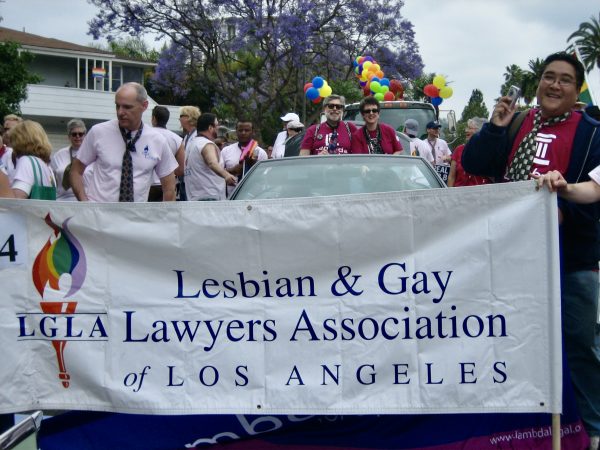
And, Jon adds, “even though I’m stepping down from paid positions, and I’m planning to take some time to take a rest and do the things that I never had time to do.… I doubt I’m really stepping away in the long term and that I will find other ways to contribute without being a full-time working civil rights lawyer.”
He’s keenly aware that resistance is needed.
“It’s a very scary time right now, no question. It’s probably the most frightening period of my long life,” Jon says. “Trump is an ego-driven, unbalanced, narcissist, erratic, mean-spirited, fungus, thin-skinned, vindictive, arrogant, corrupt….It’s hard to come up with enough adjectives. But mostly cruel, racist, sexist, transphobic wanna-be dictator….I guess the solace I take from the current period is the extent to which people are protesting.”
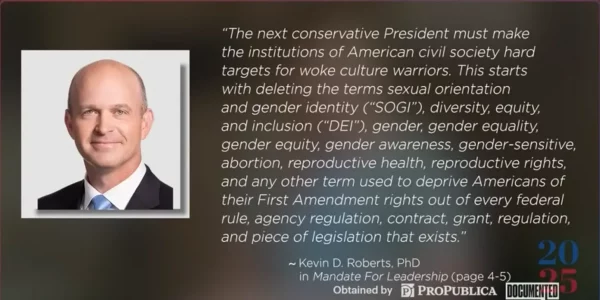
It’s not just the legal victories or the cases in which he was co-counsel or a thoughtful coach who will be missed. It’s the example Jon sets as a gay man. He emanates a deep secular/spiritual commitment to justice. He listens to everyone, regardless of class or position, embodying the old saying, “listening is an act of love.” And then he tries to find a way to help.
Jon didn’t just leave Irell & Manella, where he worked in the media and entertainment division after graduating from Stanford University, Yale Law School, and working as an attorney for eight years. He and his best friend, Sharon Hartmann, had convinced the partners to let them represent homeless people pro bono – a new and expensive concept at the time. At Jon’s retirement party, Hartmann said Jon built a team, and three years later, in 1987, they won an award for their pro bono work, and Jon, 29, made partner, which she called a “pretty good beginning.”
In fact, according to an April 7, 1987, LA Times feature entitled: “Repaying Society: Pro Bono: Renaissance in Legal Aid,” Jon “marshalled 34 lawyers, 46 secretaries and paralegals at Century City’s Irell & Manella to join poverty law firms in aiding the homeless on Los Angeles’ Skid Row.”
“Lawyers in private practice get to have a generally fortunate life. They are highly compensated, have a high status, and get a fair amount of deference and respect. Because of all those things, you really owe something,” Jon told The Times. “Part of it is, ‘Gee, this is something I really should be doing.’ But another thing is, I find it very satisfying to think there are certain people I can help.”
Jon left his Big Law Firm’s half-a-million-dollars-a-year salary to become Lesbian and Gay Rights Project Director at ACLU/SoCal under the extraordinary Ramona Ripston for $50,000. Coming out as a “gay rights activist” during Ronald Reagan’s second presidential term and the horrors of the Second Wave of AIDS was a big deal. So was his motivation.
“What initially got me into doing this work was the AIDS epidemic,” Jon tells me during our Zoom conversation. “I had quite a number of people I was close with who were very sick and who were dying. I felt like I was going to funerals every week. And so, even though I was in private law practice, I started doing pro bono work, which means ‘for the good of it’ – but it means ‘not paid,’ also.”
Jon says one of his most important cases was Chalk vs the Orange County Board of Education, a case that got national attention with a slew of other important gay and lesbian attorneys and a slew of amicus briefs, including one from California Attorney General John Van de Kamp.
Vincent Chalk was a beloved certified teacher and Regional Occupational Program coordinator for deaf students at University High and Venado Middle School. In February of 1987, after informing his supervisors that he had AIDS, Chalk was reassigned to an administrative position and barred from teaching. His claim of discrimination and request for an injunction were denied in the district court. Jon worked on his appeal, which they won. The Nov. 24, 1987, LA Times headline read: “AIDS Teacher Returns Amid Hugs, Smiles.”
“It was incredibly important to him to keep working because he found it very satisfying,” Jon says. “We won at the Ninth Circuit Court of Appeals, which governs California and other Western states, which established that people living with HIV are protected against discrimination….That started to turn [around] some of what had been people being turned away at restaurants and stores and not getting the medical care they needed. That felt very significant.”
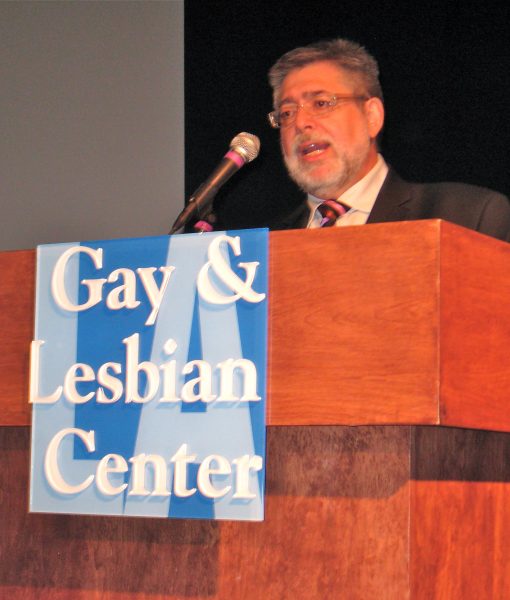
Another “really important” issue was helping make Gay Straight Alliances possible.
“I did several cases, one in Salt Lake City and one in Orange County, in which we got it established that federal law requires schools to allow those clubs to meet if they allow other non-curricular clubs to meet on campus. That really seemed to me important in terms of making it possible for young people to feel like it was okay to be out, to establish connections with other LGBTQ people, and to start to do things to change attitudes at the high school level,” Jon says.
“And there are a number of those clubs right now that meet at the junior high school level. My partner was helping run such a program when he was earning his master’s in social work at a middle school for low-income, principally Latino students,” Jon continues. “So that seemed really important in turning things around.”
But, says Jon, the case that “touched me the most emotionally” was where I represented a man from Mexico who fled to the United States after he was threatened with his life by Mexican police, who assaulted him, stole his clothes, and left him in the middle of the desert. He came to the United States, sought asylum, and was initially denied asylum by an immigration judge who said, ‘Well, you don’t look gay to me. And so, you can go back to Mexico and just don’t make an issue of it, and you should be fine.’”
Jon appealed, and the case was sent back to the same judge, who changed his mind, “in part through the argument that, wait a minute – people who are persecuted in other countries for their religion or their politics are not told, ‘Oh, just don’t make an issue of it. Don’t let other people know.’ Those are grounds for asylum, not for denial of asylum.”
They got a new trial, and the judge granted asylum from the bench. “I walked out with my client, and he started crying and saying, ‘Wait. Does this mean that I get to stay? That I’m not going to be sent back?’ And it was just feeling so directly like you had really turned somebody’s life around. It felt an honor to be able to do that for someone.”
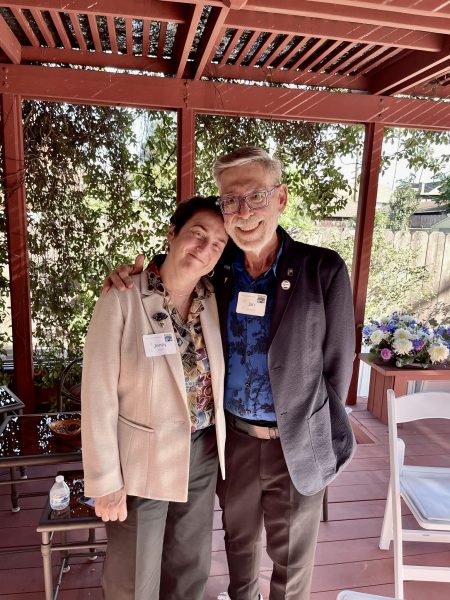
In 2017, Jon unexpectedly left his job as Legal Director at Lambda Legal, working closely with “work wife” Jenny Pizer. He went to Freedom for All Americans as their Chief Counsel, and later, he returned to the ACLU as Senior Counsel at the National ACLU LGBTQ & HIV Project.
Camilla Taylor, Deputy Legal Director for Litigation at Lambda Legal when Jon left, wrote an extraordinary tribute, with stories about and links to some of his hundreds of cases.
“If I had a nickel for every time I’ve witnessed JD up at ungodly hours to work, sifting through legal materials and strategizing with his colleagues about how to conquer a problem or action against our community, mastering every minute detail, we could shut down Lambda Legal, colonize Mars, and turn it into the queer utopia of everyone’s dreams.” Taylor wrote.
And that queer utopia includes individuals having the real freedom to determine how they wish to live their lives. Asked why Jon – who helped win marriage equality – has eschewed marriage for himself and his longtime domestic partner, psychotherapist Syd Peterson, Jon says simply: “We won the freedom to marry, not the obligation to marry. And for Syd and me, it was not the way we conceived of our relationship. We always had an open relationship, and certainly some people who are married have. But in more recent years, we’ve had an openly polyamorous relationship.”
But, since he co-drafted with Jenny Pitzer the California Comprehensive Domestic Partnership Law, “I felt some loyalty to it. So that was important to me.”
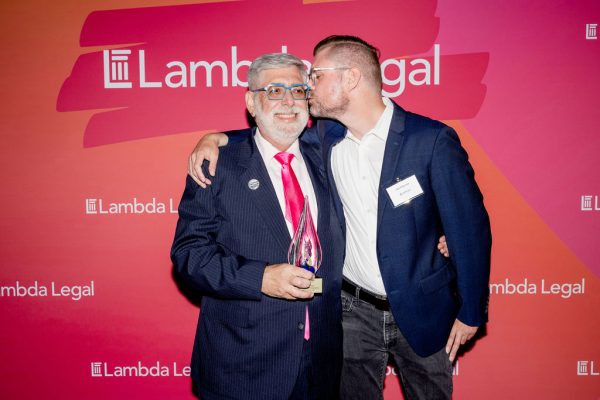
Jon says he was not open about his relationship with Syd because he anticipated that people would react badly, not understanding how being in a polyamorous relationship worked.
But at some point, the explainer-in-chief came to understand that that was being in the closet again. He felt some responsibility to let people know that it was okay and that it can work for some people, not for everyone. He says he just feels it’s important to fight against the lack of understanding and prejudice.
After giving tips on how to have such a successful, compatible, intergenerational relationship, Jon says, “I must admit – I never really thought we’d be together 21 years.”
“People need to figure out a way to survive,” Jon says in parting. “What I would add is for people not to give up hope – then the other side has surely won.”
Karen Ocamb is a veteran journalist and the former news editor for Frontiers Magazine and the Los Angeles Blade. This essay is cross-posted from her Substack LGBTQ+ Freedom Fighters. Please visit that cite to watch her in-depth video conversation with Jon Davidson about LGBTQ+ people and “strict scrutiny,” as well as the LAPD and other issues.
Features
Liliana T. Pérez-Palacios uplifts BIPOC, immigrant and queer rights with the L.A. Chargers
The L.A. Charger’s Sr. Director of Cultural Affairs talks coming out on national TV and making the local sports space more queer-inclusive.
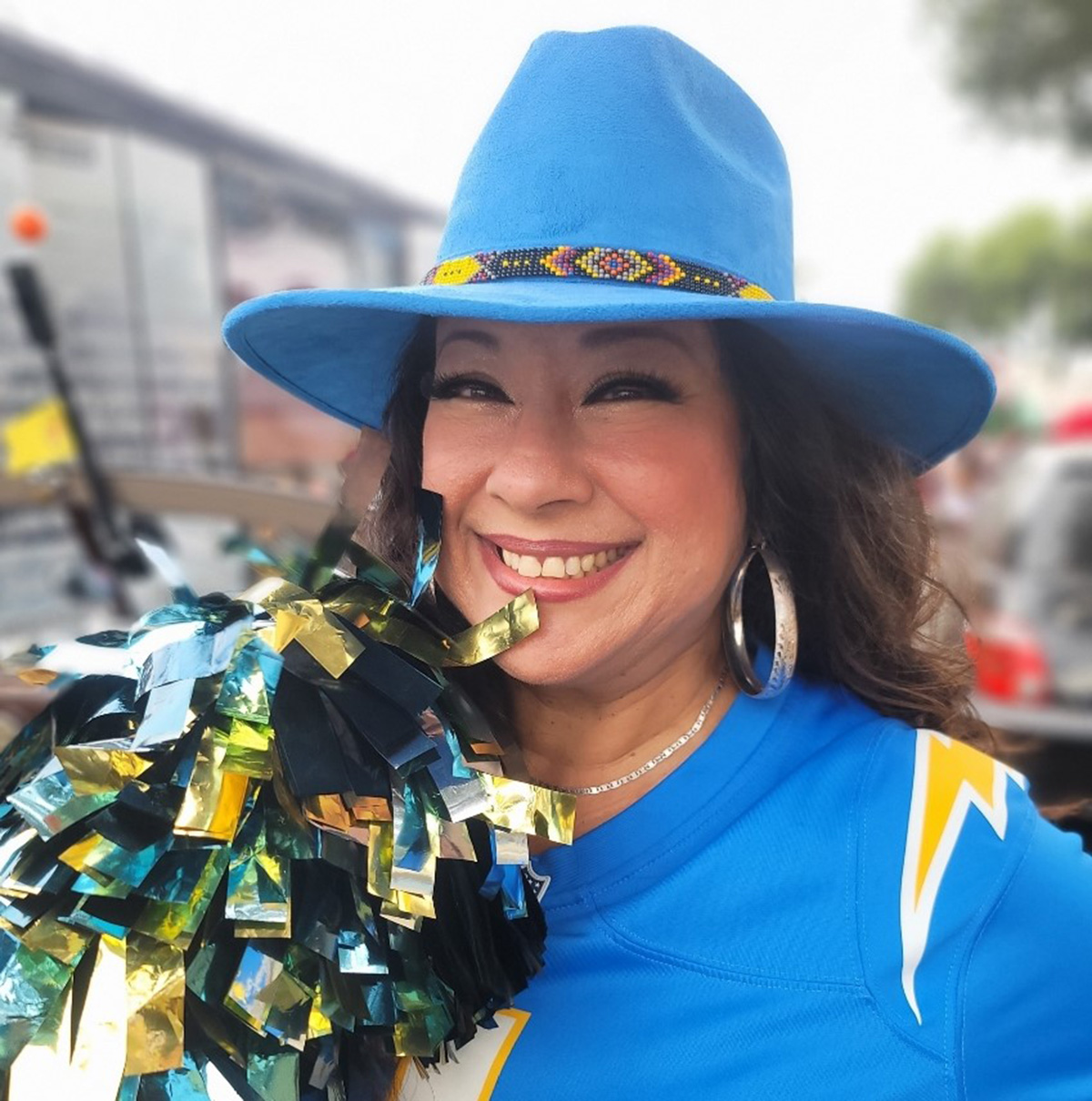
At an L.A. Chargers game, football fanatics donning powder blue and gold jerseys can be heard crying out: “Bolt up!” as players on the field tackle, run, and charge with an electric energy. People grip their seats, their eyes darting back and forth as they witness a kind of alchemy happening in front of them.
In the midst of this exuberant chaos, Liliana T. Pérez-Palacios mingles with Chargers fans, greeting them excitedly as they celebrate a sport that brings them closer to the community around them. Pérez-Palacios is the team’s Senior Director of Cultural Affairs, and her role allows her to exercise her greatest passion: uniting the city’s diverse tapestry of people and providing them a space to discover joy and belonging.
Growing up: navigating her queerness and activism
Pérez-Palacios’ childhood flitted back and forth between fear and empowerment, the two emotions woven into the fabric of her adolescence. As a toddler, she immigrated from Mexico to the U.S. with her mother, eventually settling in the county’s Pico-Union neighborhood. She remembers the persistent, looming threat of immigration officials and the constant presence of poverty.
But, rather than embed these fears into shame, she learned to translate and transform her struggle into affirmation, power, and self-liberation. “I don’t live by what others think of [or] say about me,” Pérez-Palacios told the Blade. “I need to live my truth, and that’s something that was instilled in me since I was a kid.”
Self-possessed and strong, Pérez-Palacios wanted to turn that courage outward and support other marginalized community members seeking refuge and comfort. As a student at Cal State University, Northridge (CSUN), she developed her passion for social justice, serving in student groups like Movimiento Estudiantil Chicano de Aztlán (MEChA), Strong Queers United in Stopping Heterosexism (SQUISH), and Students Against Apartheid.
“[I was] a young Latino kid, wanting desperately to help people like me feel welcomed and at home,” said Pérez-Palacios, who was inspired by the bold, “in your face” approach that organizations like AIDS Coalition to Unleash Power (ACT UP) adopted.
While her deep involvement with activism on campus led her away from her studies, this intense dedication to social justice led to a career in government service beginning in 1995. She served six Speakers for the California State Assembly as well as former California Governor Gray Davis.
Her civic engagement then caught the attention of Mayor Karen Bass in 2023, when she was appointed to be President of El Pueblo de Los Ángeles: a historic district that preserves the county’s Latine roots.
Coming out on national TV
Before these steps into local governance, Pérez-Palacios stepped into the limelight to advance queer visibility, even if it meant risking her closest relationships. She was in her early twenties when she heard that Cristina Saralegui, host of the major daytime Spanish-language talk show “El show de Cristina”, was making a tour stop in L.A. “No one was bigger than Cristina,” Pérez-Palacios recounted, who was determined to appear on the show to discuss the Latine LGBTQ+ community, and how it is impacted by suicidality.
Pérez-Palacios felt it was critical to discuss the mental health crisis amongst queer Latine youth, and came out as queer on the show in a brave display of personal solidarity. “I wanted to make sure that our community was never lost in translation,” she said. “Our lives are impacted by hate. I needed to put a face to it and say: Stop hurting us. We’re your family members too.”
She remembers her own family being shocked: there was the endless stream of opinions they threw at her for being openly queer. Her mother, whom she calls her best friend, “wasn’t ready for it” at the time. Still, Pérez-Palacios understood the gravity of the harm impacting LGBTQ+ people like herself, and this outweighed the potential rejection and ignorance she would receive in her own life.
Her mother came around soon after. “I’m her kid,” Pérez-Palacios said. “Her love is greater than anything else.”
Pérez-Palacios’ approach: creating an “orchestra” versus a “melting pot”
Pérez-Palacios credits her bravery to the importance of honoring the various identities that make up who she is. She fights for women, immigrants, Latine community members, and people impacted by poverty. “We’ve been trained to be ashamed,” Pérez-Palacios said. “[But] there’s no shame. If anything, there’s great pride there. We are communities of resilience and creation. When we don’t have anything, we create something.”
She leads with this ethos as she heads the development of cultural sensitivity and community-building at the L.A. Chargers. She is constantly looking for ways to bring different folks into the space and to help them embrace themselves in the celebration of the sport. The core of her work is being intentional about representing the rich cultural and social histories of L.A.’s eclectic communities: honoring their legacies of resistance, unity, and survival.
Today, she is excited about growing this “footprint” and bringing in more queer folks to the games. She hopes that by making this avenue of her professional career more inclusive, she can motivate the people around her to resist erasure and thrive together in each other’s unique origins and journeys.
“I hate the term, ‘melting pot.’ I do not want to be a melting pot,” Pérez-Palacios said. “I do not want you to be like me. I want us to be a beautiful orchestra. Together, through harmonizing, we create something amazing.”
Kristie Song is a California Local News Fellow placed with the Los Angeles Blade. The California Local News Fellowship is a state-funded initiative to support and strengthen local news reporting. Learn more about it at fellowships.journalism.berkeley.edu/cafellows.
Features
“We will get through all of this”: Culver City’s first LGBTQ+ Mayor discusses queer community and hope
Freddy Puza shares empowering words for queer youth and discusses his journey through local politics and advocacy.
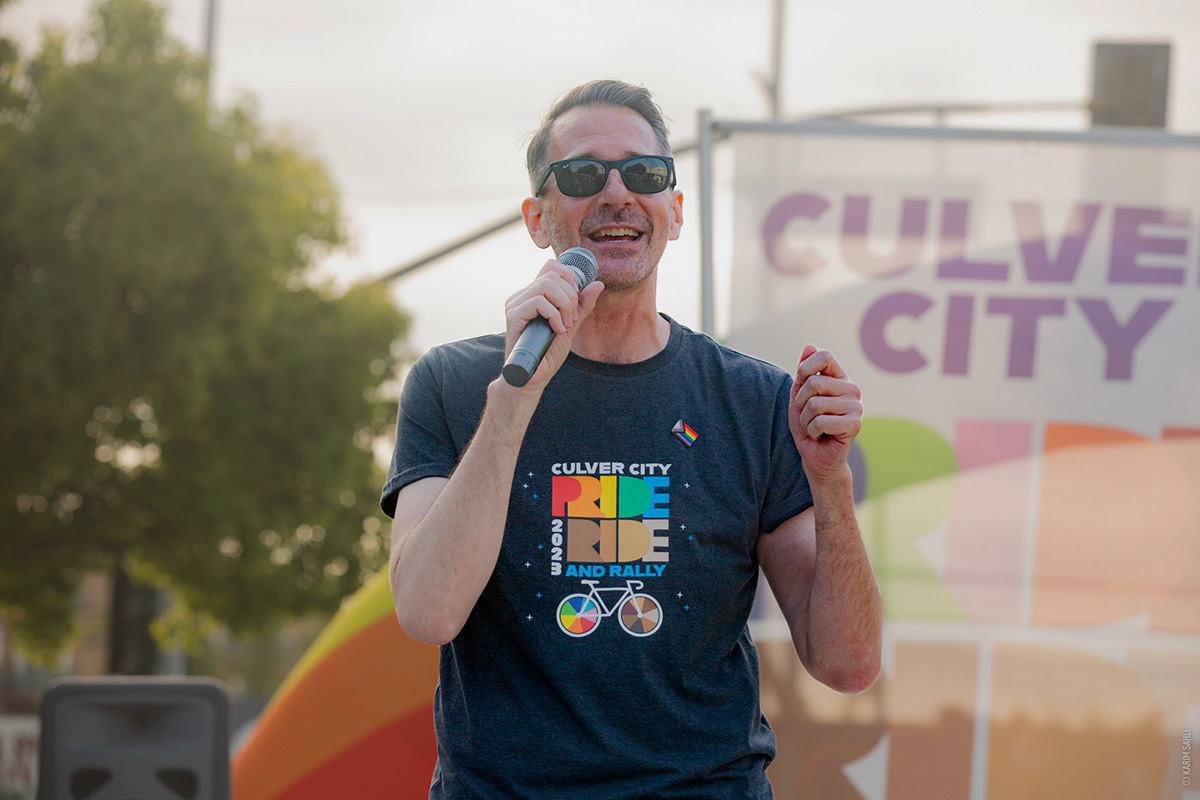
On Dec. 8, Freddy Puza was elected to be Culver City’s mayor, after a decade of dedicated service to the City. His journey of advocacy began after he moved to Culver City in 2011, when he immediately dove into local social services programs and activism.
In 2016, he banded together with fellow residents to call on Culver City to become a sanctuary city and protect its immigrant community members. In March 2017, its city council adopted a resolution that solidified this call to action. The resolution prohibits law enforcement officials from sharing data and information with immigration authorities.
Puza also volunteered on Culver City’s homelessness and general plan advisory committees before he was elected to the city council in 2022. Now, as mayor, he hopes to deepen his connections with fellow residents and build upon what he’s learned from his journey so far. “Every year that I’ve been on council, I’ve grown into a new person,” Puza told the Blade. “I see how the city and community work in a different way.”
His down-to-earth leadership approach centers on listening and making people feel heard: a feeling he struggled to find during his own coming-of-age. “That’s a lot of the work that I think the city council is responsible for,” Puza said, “We set policy, but we also create and maintain community. I want to make sure that everyone is folded into the process: that it’s an inclusive city, and that people feel like they belong.”
The Blade sat down with Puza to discuss how he first formed queer community and how he hopes to set a precedent for the way local government can stand up for and protect its diverse constituents.
Isolation in faith: growing up without queer community
When Puza was five, his family relocated from the Windy City to the suburban bubble of Irvine, California: sweeping him up in a whirlwind of transition and change. His parents were devoutly Catholic and found solace with other Catholic families. Charity, volunteering, and local involvement were also always emphasized at home, so there was the constant presence of others.
But in the midst of this persistent chatter and noise, Puza was alone. “I grew up in a faith community that wasn’t open to being gay, so it was really challenging to move through that,” Puza told the Blade. “While my friends were doing professional development, I was doing personal development and coming to terms with who I was.”
Throughout Puza’s childhood, LGBTQ+ representation was minimal, if not outright negative. People around him weren’t coming out or having open conversations about their gender or sexuality. Marriage equality hadn’t yet passed, and he was not in proximity to queer scenes and leaders modeling unity and pride as he searched for belonging.
Puza remembers feeling “petrified” at the prospect of being out, and waited to do so in college. He also decided to leave his faith community and focus on his mental health and self-acceptance. This became his turning point. “I think, when you embrace your identity, ‘like attracts like,’” Puza said. “When I came out, all of a sudden, I started to see LGBTQ+ people amongst me and in my environment.”
Culver City was the “Goldilocks” perfect fit
Puza moved to L.A. in 2001, bouncing from Venice to Silver Lake to West Hollywood before landing in what feels like his best fit. “I do consider Culver City the ‘Goldilocks’ [of these neighborhoods]. It’s just right,” Puza said. “It’s just home.”
He first sought out the region for its diversity and vast, boundless sense of opportunity. He joined organizations that focused on LGBTQ+ civil rights and protections like the Human Rights Campaign and Equality California, meeting friends and mentors who brought him more deeply into the local queer community. “It was so essential to have those people that I’m still friends with, who I’m so close with,” Puza said. “All of that combined really got me involved.”
Why Culver City specifically? “It’s a small city relative to Los Angeles, but there’s so much opportunity to get involved with local change,” Puza told the Blade. “Culver City residents get to know their council members, and there’s a lot of activism going on [here].”
Advocating for unhoused residents: Puza’s first foray into local government
When Puza first began volunteering in direct services to support unhoused residents living in Skid Row, he learned about systemic and structural barriers and issues that perpetuate homelessness in the county. This is when he began to understand that problems and solutions are intertwined, and both begin at the local level.
Inspired by the everyday leaders around him, Puza jumped into action and joined Culver City’s homelessness committee in 2015. “Many times, people get frustrated with the government and don’t see it as something that can bring actual change,” Puza said. “So the fact that I was seeing all these community members in Culver City engaging in change and really caring about their neighbors: that compassion moved me.”
Today: Puza’s hopes and aspirations as mayor
Currently, Puza is working with fellow Culver City city officials to build a clear five-year Capital Improvement Plan. This includes setting targets for infrastructural improvement projects as well as increasing housing affordability and sustainability while generating more revenue.
Culver City’s population is expected to double in the next decade or two, and the City remains in a structural deficit. Puza hopes to strategize ways to streamline programs and processes while creating new systems that can get the City “back on track.”
He is also focused on protecting the safety of his community members as fears surrounding Immigration and Customs Enforcement (ICE) agents are on the rise, especially with the recent ICE-related murders of Renee Nicole Good and Keith Porter. LGBTQ+ hate crimes are also on the rise, and queer rights are being targeted. Where the federal government fails, local governance and activism are revitalized, Puza says.
“People really do want to see the government deliver tangible things, and local government’s where that is at,” Puza told the Blade. “The federal government is not going to be helpful in the ways that are the most beneficial to community members. I believe in putting care for the individual, uplifting people, and giving them the tools to succeed: not punitive punishment.”
How can community members get involved?
There are many committees to join, as well as several open commission seats, according to Puza. He also encourages residents to directly get in touch with him or attend listening sessions where they can engage in dialogue with him and other community members.
“Those are really valuable opportunities to hear directly, and I want to always be listening to the community,” Puza said. “I want to make sure I’m in alignment with the community, and that the values that I set out with are still what the community and our residents want.”
And for queer youth and other LGBTQ+ people seeking belonging, the way he’d done years before, Puza offers this piece of advice:
“Find community and mentors who can help and guide you. It is a scary time, but I am a cynical optimist. So, I always believe, no matter what’s going on and how terrifying and horrible it is, we will get through all of this. You will make it. It will be tough, but have that strength inside to know yourself. I learned to love, accept and take care of myself, because we can’t give if we’re out of alignment. So really learn about yourself, and then go out there and don’t be afraid.”
Kristie Song is a California Local News Fellow placed with the Los Angeles Blade. The California Local News Fellowship is a state-funded initiative to support and strengthen local news reporting. Learn more about it at fellowships.journalism.berkeley.edu/cafellows.
Features
“We deserve to have a future here”: How we can support queer AAPI communities in 2026
This week, the Blade sat down with AAPI Queer Joy’s leader Jeff Deguia to reflect on his activism goals in the new year.
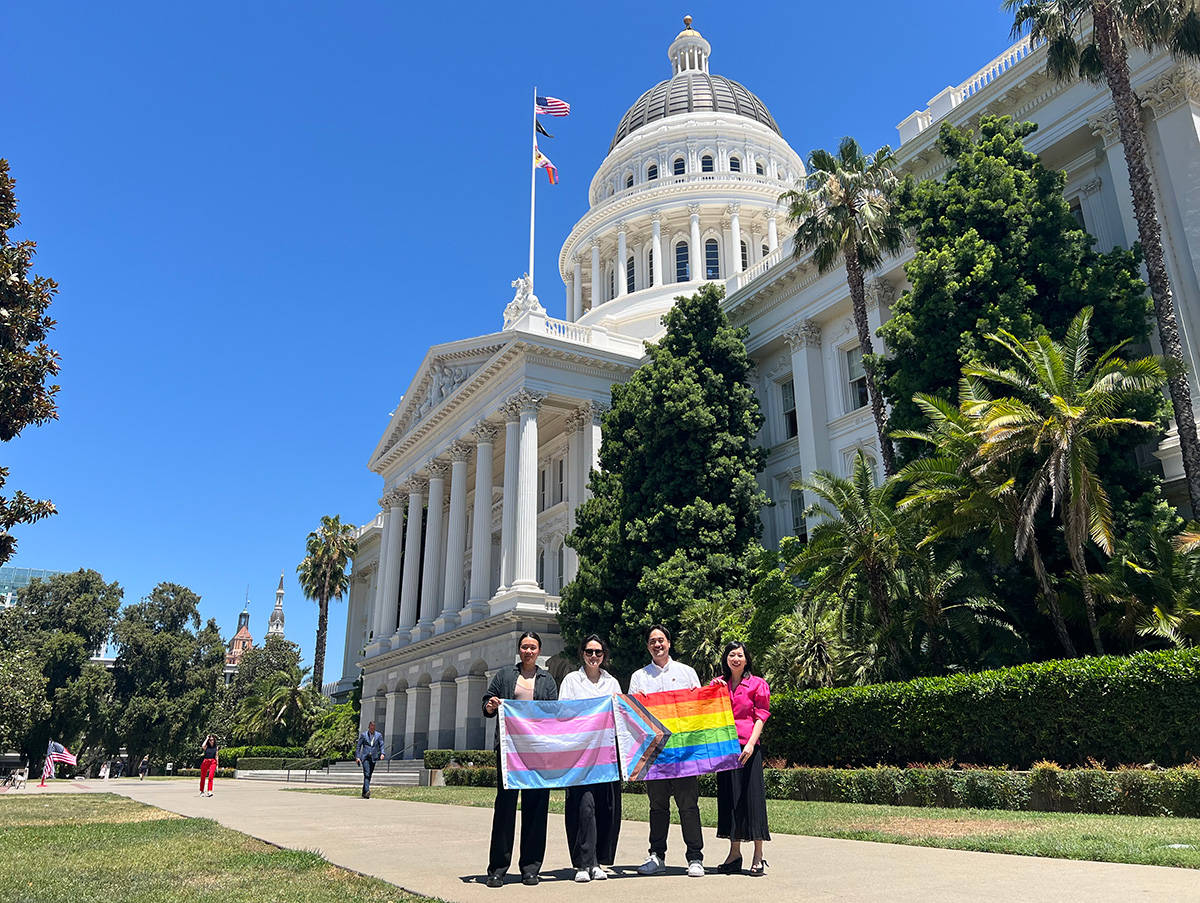
AAPI Queer Joy is a queer-led and focused coalition formed by Asian Americans Advancing Justice Southern California (AJSOCAL) policy advocate Jeff Deguia. In a previous feature, the Blade learned more about Deguia’s activism journey, from his Filipino American upbringing in Chicago to his exuberant, inclusive leadership in Los Angeles. We also interviewed Lan Le, a fellow AJSOCAL policy advocate and AAPI Queer Joy leader who is passionate about supporting other queer refugees and domestic violence survivors.
The coalition currently includes six grassroots civil rights organizations, including: AJSOCAL, Viet Rainbow of Orange County (VROC), the Bay-Area based Lavender Phoenix, Search to Involve Pilipino Americans (SIPA), Moonbow, and Hmong Innovating Politics (HIP).
AAPI Queer Joy formed in 2024, and that initial year was focused on increasing visibility and establishing the coalition’s existence. Last year, in 2025, AAPI Queer Joy began to amp up advocacy efforts, and each organization involved worked together to put together the coalition’s first-ever bill package.
This package included three bills: AB 1487, AB 678, and SB 418, focusing on expanding funding opportunities for two-spirit community members, creating an LGBTQ+ inclusive council on homelessness, and building stronger access to gender affirming care, respectively. The Blade reported on these bills in October.
Deguia found it fulfilling to dive into LGBTQ+ focused legislation and support his coalition members in bringing their advocacy work to the state level. Most of these partner organizations, like Viet Rainbow of Orange County, are hyper-local, aiming their on-the-ground efforts to specific regions.
They’re also small, with teams that often cap out at around 10 staff members. “They’re wearing a lot of hats,” Deguia told the Blade. “So for them to add to their capacity to do advocacy work and understand the importance: I’m grateful to them.”
This week, the Blade sat down with Deguia to reflect on AAPI Queer Joy’s growth in 2025, the challenges they faced, and how he hopes to grow the coalition in 2026.
Challenges AAPI Queer Joy faced in 2025
Deguia explained to the Blade that language access and cultural bridging can be difficult within the AAPI community, especially when it comes to having conversations around being queer with immigrant family members. “[For] certain LGBTQ+ vocabulary, there are no translations in AAPI languages sometimes,” Deguia said.
Tools like Google Translate have their limitations and don’t include the necessary cultural context needed to have sensitive discussions about identity and relationship-building. This often means staff members have to do additional work to translate certain terms and then ask their partner organizations for further support.
“We want to make sure that the LGBTQ+ community will feel understood, but also that their loved ones, their allies, parents, grandparents, and other folks will be like: Oh, this helps me understand what this word would be in language,” Deguia said. “So that’s definitely tough.”
Deguia and this reporter also discussed the concept of being “out” and how that experience is complicated for diasporic people who both live in the West and also belong to a different culture. In some Asian countries, where communal unity is valued over individualistic pride, being “out” should be treated with contextual nuance. Whether or not someone feels comfortable being out, Deguia hopes that community members make their choice through empowerment rather than shame or pressure.
“For AAPI people who are born here or raised here when they’re really young, [the question can be]: How do we make our own way and make sure that we’re living on our terms?,” said Deguia.
“Being out [can be a] proud moment, but understanding the cultural parts of being AAPI and not necessarily being out also has its own importance in the community. And saying that not being out is wrong, or having these really strong opinions on it, is unfair. That’s nuance and lived experience. It’s about cultural balance.”
How does AAPI Queer Joy hope to grow in 2026?
Deguia points to three main goals in this new year: seeking stories and inspiration from community elders, expanding the coalition, and organizing an AAPI Queer Joy event in L.A.
He hopes to lean on elders to better understand the lineage of activism before him, and to carve out a path built on history and imagination. While these elders had no “blueprint” of their own, Deguia hopes to hear their stories as they move towards a shared, intergenerational goal together.
“I’m building upon what has been done before me,” Deguia said. “I think about the folks who had everything set up against them, who believed: ‘I’m trying to get easier for someone after me.’ I’ve gotta understand my history so I can make a better path forward for [those] after me.”
When it comes to growing the coalition, Deguia has inclusivity at the forefront of his mind. He wants to include more partner organizations from the South Asian and Pacific Islander communities, which are often underrepresented in broader conversations around being AAPI.
“I don’t think I can call it AAPI Queer Joy without having reps from every part of that beautiful community,” Deguia said. “I [also] want to make sure that the whole state’s being represented well, like central California, SoCal, NorCal. There are communities that have a voice and want to show up and be in these kinds of conversations.”
To activate these communities, AAPI Queer Joy puts on their annual Jade Jubilee: an event that is both celebratory and productive when it comes to what the coalition has achieved and how they hope to strengthen its advocacy work. Jade Jubilee was organized in Sacramento last year, and Deguia wants to bring something on this scale to L.A. too.
“The QTAPI community in L.A. and Orange County is really rich and diverse,” Deguia said. “I want to showcase that there’s an organization based in L.A. here that is doing this work. I want to engage the community here more.” When thinking about accessibility and engagement, Deguia sees these potential local events as a chance to give friends and community members the tools, knowledge, and joy needed to move forward together.
How can we support AAPI Queer Joy?
Small actions can have large impacts. Deguia mentions the power of sharing the coalition’s social media posts, which often highlight their legislative campaigns and efforts, as well as supporting its partner organizations. There are grassroots groups out there who are connecting like-minded people: seek them out as a first step.
From there, you can learn about attending events and rallies, and understand the importance of individual efforts like calling representatives (which can also be done in community!) to voice your concerns and perspectives. Many of these local organizations provide scripts and workshops to ease fears and anxieties around these actions.
And, whenever possible, don’t turn away. It is demoralizing to see the constant threats to LGBTQ+ safety and rights, and the constant attempts to self-soothe are exhausting. But now, more than ever, it is necessary to understand what is happening around us and how we can empower one another with support, knowledge, and resistance. “If we turn our backs completely, forget and just live in our privilege, one day we’re gonna wake up, and things will be gone,” Deguia said.
Deguia: Being resilient and brave is something I wish we didn’t have to do all the time as queer folks, but [this moment] is asking for that. In a country and administration that’s telling us that we don’t have a right to exist, we have to be brave and tell them and show them that we deserve to be here like everybody else.
At the core of all the pain and all the fear, the core in our heart [has to be]: “I deserve to be here. I deserve to have a future here. My friends deserve to be here. Trans folks deserve to be here. I will do what I can in my power to make sure that we exist and we can live lives that are full of thriving and opportunity. Fighting and believing in our existence and our futures have to be at the core of how we live every day.
Kristie Song is a California Local News Fellow placed with the Los Angeles Blade. The California Local News Fellowship is a state-funded initiative to support and strengthen local news reporting. Learn more about it at fellowships.journalism.berkeley.edu/cafellows.
Features
Legendary organizing activist Dolores Huerta, 95, rides in AHF’s ‘Food for Health’ Rose Parade float
This year’s float honors AHF’s food banks, free farmers’ markets, veterans’ food programs, and massive SoCal wildfire food relief efforts for evacuees and first responders
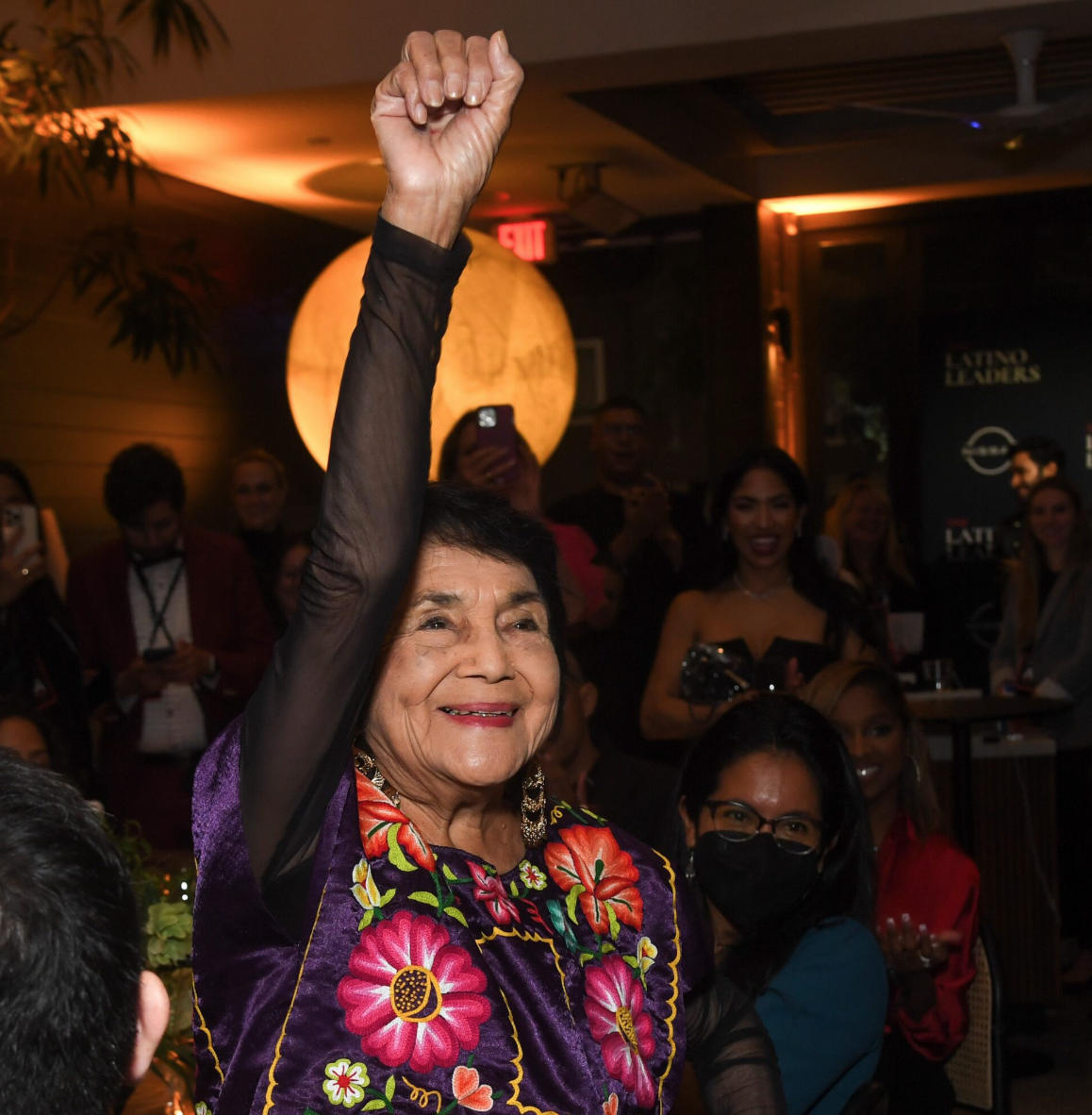
Need some inspiration for 2026? Fix your gaze on the Pasadena Tournament of Roses this Jan.1 to find the amazing, legendary civil rights and union activist Dolores Huerta riding on AIDS Healthcare Foundation’s “Food for Health” float in the Rose Parade – an incredibly fitting community tribute to the 95-year-old co-founder of the National Farm Workers Association (now United Farm Workers) with the late Cesar Chavez.

The AHF float spotlights the organization’s national initiative to combat hunger and food insecurity by providing nutritious groceries – including produce, bread, dairy, and other staples– to families and individuals in need. Their program is illustrated through “a vibrant ‘Jack and the Beanstalk’ motif, symbolizing growth, nourishment, and the power of community collaboration,” with oversized pumpkins, carrots, eggplants, and strawberries “representing the abundance that can bloom when people work together,” KTLA noted in a recent story. An overflowing farmer’s market truck is a tribute to “AHF’s volunteers and partners who served more than 75,000 meals to wildfire evacuees and first responders earlier this year.” (Click here to see KTLA’s report on the AHF float.) AHF reports that by the end of 2025, its Food for Health program “will have served over half a million people across the country with weekly groceries.”
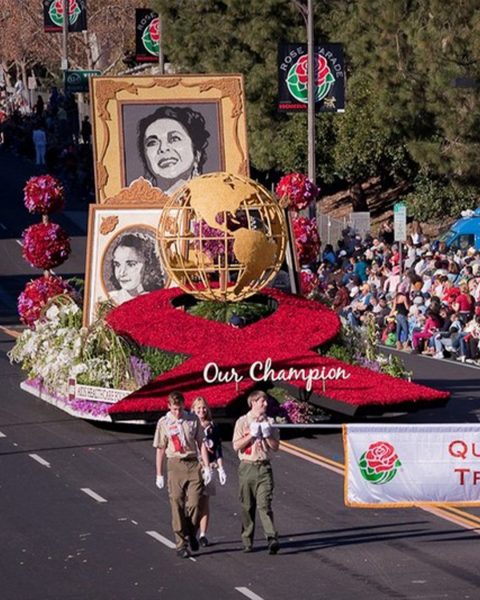
While AHF has a reputation for illustrating significant issues through the Rose Parade – starting in 2012 with their float tribute to “Elizabeth Taylor: Our AIDS Champion” – this year’s focus on food insecurity and the possibility of hope through community collaboration is particularly significant.
While Donald Trump calls today’s affordability crisis a Democratic “hoax,” many Americans believe their own eyes. “Roughly 9 in 10 U.S. adults, 87%, say they’ve noticed higher than usual prices for groceries in the past few months, while about two-thirds say they’ve experienced higher prices than usual for electricity and holiday gifts. About half say they’ve seen higher than normal prices for gas recently,” according to a Dec. 12 AP-NORC poll.
Meanwhile, while Congress may have temporarily saved Supplemental Nutrition Assistance Program (SNAP) from major drastic One Big Beautiful Bill funding cuts – SNAP helps approximately 1 in 8 Americans afford groceries – the bill added confusing new restrictions on who could receive food aid based on employment and immigration status, according to The Hill.
“The battle over SNAP isn’t over yet, either. States are still on the hook to rein in their error rates or face further funding cuts,” The Hill reports. “The Trump administration is also threatening to withhold benefits from states that don’t hand over data on participants, including their immigration statuses.”
Dolores Huerta personifies that intersectionality of people, of issues, and “the power of community collaboration.”
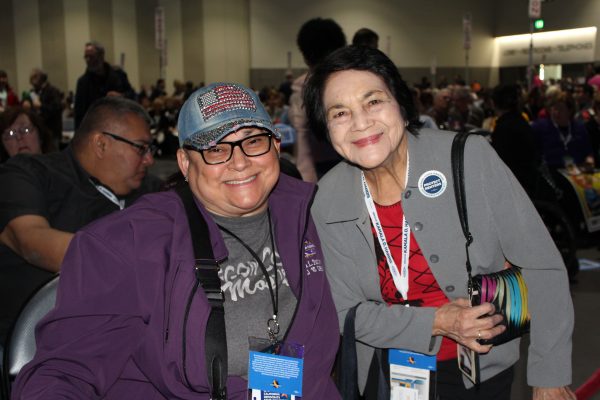
“AHF celebrates Dolores Huerta as a national treasure supreme. Dolores represents our unsung farm workers who, regardless of their status, toil so hard to put food on our tables. Yet, millions of people go hungry in the richest country in the world. The mission of AHF’s Food for Health could have no better representative than Dolores,” says AHF Co-Founder and President Michael Weinstein. “Dolores has also been a steadfast comrade in arms on LGBT and renters’ issues.”
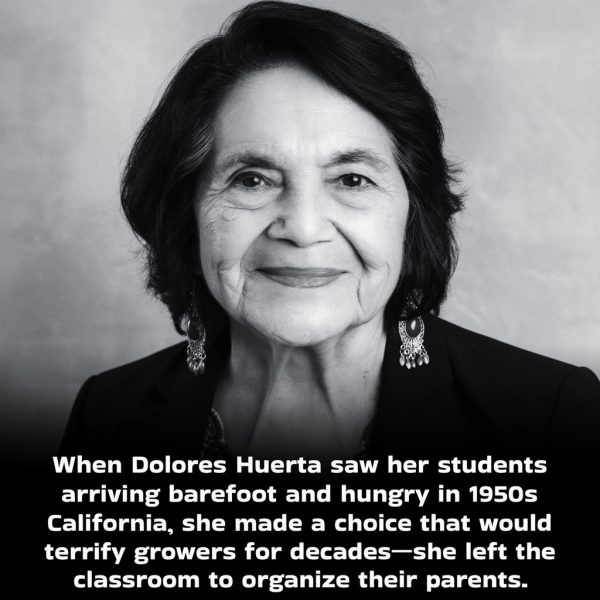
That Huerta advocates on renters’ issues is a natural extension of the mentoring she received from her independent mother, Alicia, who owned a 70-room hotel in Stockton, California, with affordable rates and breaks for low-wage workers. She was civically active and encouraged her daughter to appreciate cultural diversity in their agricultural community of Mexican, Filipino, African-American, Japanese, and Chinese working families.
Huerta got involved with the community, too, as well as earning a provisional teaching credential at the University of Pacific’s Delta College and getting married, and having two daughters. According to her foundation, “While teaching, she could no longer bear to see her students come to school with empty stomachs and bare feet, and thus began her lifelong journey of working to correct economic injustice.”
Her experience in leadership at the Stockton Community Service Organization led to her founding the Agricultural Workers Association, where she started a voter registration drive. In 1955, she married Ventura Huerta (with whom she had four more children), worked with Fred Ross to start the Community Service Organization, and met César E. Chávez. The two shared a vision to organize farm workers, and in 1962, they launched the National Farm Workers Association (NFWA). Huerta’s skills in lobbying, negotiating, and organizing led in 1963 to her securing the then-unimaginable Aid for Dependent Families and disability insurance for farm workers in California.
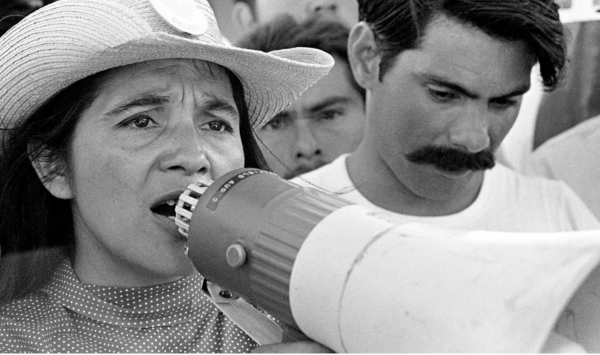
Huerta and Chavez saw NFWA as part of the larger civil rights movement and decided to back the Filipino-led Agricultural Workers Organizing Committee, an AFL-CIO labor union led by Filipino American organizer Larry Itliong, in what became the historic national 1965 Delano Grape Strike and boycott. Their coalition with the Student Nonviolent Coordinating Committee (SNCC) and the Congress of Racial Equality (CORE), as well as other union organizers and student activists, drew parallels between the Jim Crow South and rural California in the struggle for racial, social, and economic justice. By April 1966, the national boycott against Schenley Industries, the second largest grape grower in Delano, California, was so successful, Schenley agreed to sign a labor agreement with the NFWA, the union’s first, negotiated by Dolores Huerta.
In 1966, NFWA merged with the Filipino Agricultural Workers Organizing Committee to become the United Farm Workers Organizing Committee – later pared down to the United Farm Workers. Coalition building continued, including with prominent civil rights leaders and politicians, such as Martin Luther King Jr. and Robert Kennedy.
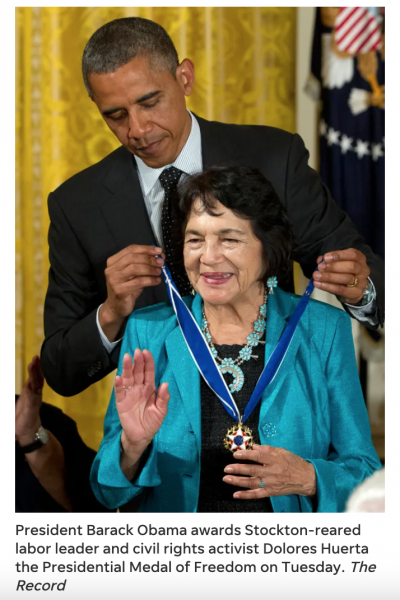
On May 29, 2012, President Barack Obama presented Dolores Huerta with the Presidential Medal of Freedom, saying she and the other honorees had “marked my life in profound ways.”
Obama also injected some humor into the ceremony in the East Room of the White House.
“Dolores was very gracious when I told her I had stolen her slogan, ‘Sí, se puede.’ Yes, we can,” Obama said, referring to his familiar 2008 campaign slogan. “Knowing her, I’m pleased that she let me off easy, because Dolores does not play.”
“Without any negotiating experience, Dolores helped lead a worldwide grape boycott that forced growers to agree to some of the country’s first farm worker contracts. And ever since, she has fought to give more people a seat at the table,” Obama said. She is one of those individuals who says, ’Don’t wait to be invited. … Step in there.’”
Huerta is a woman of action, including standing up for the freedom to marry for same sex couples, even though the fundamental right was disparaged by some in her Latino community.
“Our relationships with the ones we love and our Latino identities are two of the biggest reasons why we should care about equality for lesbian, gay, bisexual, and transgender people in America. When we see our Latino hermanos y hermanas harassed and held back simply for being who they are; when we can’t come together to celebrate a wedding for our gay friends; and when we know they don’t have the same opportunities we take for granted, it affects us personally,” Huerta wrote in a widely distributed June 14, 2013 essay for NBCLatino.
“I’ve spent my life championing both labor and civil rights causes and getting to know diverse perspectives; I’ve come to see that the struggles gay people face are intertwined with my own struggles,” she continued. “Let’s each do our part by being open about who we are, by accepting one another without shame or judgment, and by sharing our stories in every way possible. Whether it’s our hijos or hijas, hermanos or hermanas, or tíos and tías, we believe in the same freedoms for everybody, no matter who you are or whom you love.”
AHF launched in 1987 as AIDS Hospice Foundation with Michael Weinstein and a handful of friends trying to provide hospice care and advocacy for people with HIV/AIDS – “fighting for the living and caring for the dying” – during the Second Wave of AIDS when “freedom” often felt meaningless. The Chris Brownlie Hospice provided the last light of nurturing dignity.
Today, AHF is the world’s largest HIV/AIDS healthcare organization serving more than 2.8 million individuals across 50 countries, including the U.S. Recently, the nonprofit opened a new AHF Healthcare Center in Memphis, Tennessee, and another in Detroit, Michigan, bringing the total to 19 states, Washington, DC, and Puerto Rico. AHF services have also expanded to include food, shelter, disaster relief, and wellness services.“The responsibility of bringing as many people as possible into the lifeboat of care remains staggering, but is a challenge AHF will continue to take on,” Weinstein said on World AIDS Day.
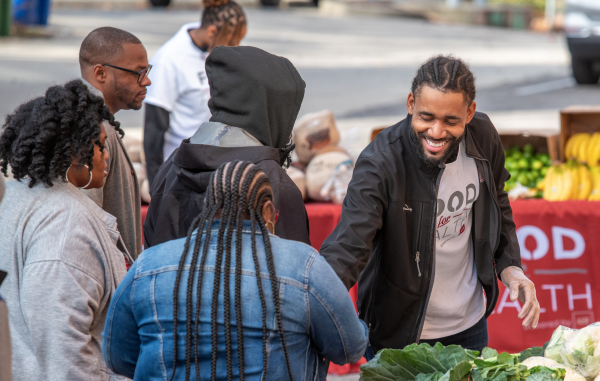
As the AHF “Food for Health” float steers down Colorado Boulevard in Pasadena on New Year’s Day, think of what “affordability” and “being of service” mean to you. Perhaps you, too, may be inspired by United Farm Workers Dolores Huerta or any of the other local heroes, or AHF staff and volunteers waving back at you, and join “the power of community collaboration.”
Karen Ocamb is a veteran LGBTQ+ journalist. This essay is cross-posted from her LGBTQ+ Freedom Fighters Substack.
Features
Where craft meets community: Inside Zion Liu’s and Christian Leon’s small biz ‘Here & Always’
In a season dominated by Black Friday frenzy and mass production, Here & Always rises above as a purpose-driven & queer-founded marketplace born from a desire to share beautifully crafted & deeply meaningful objects rooted in community
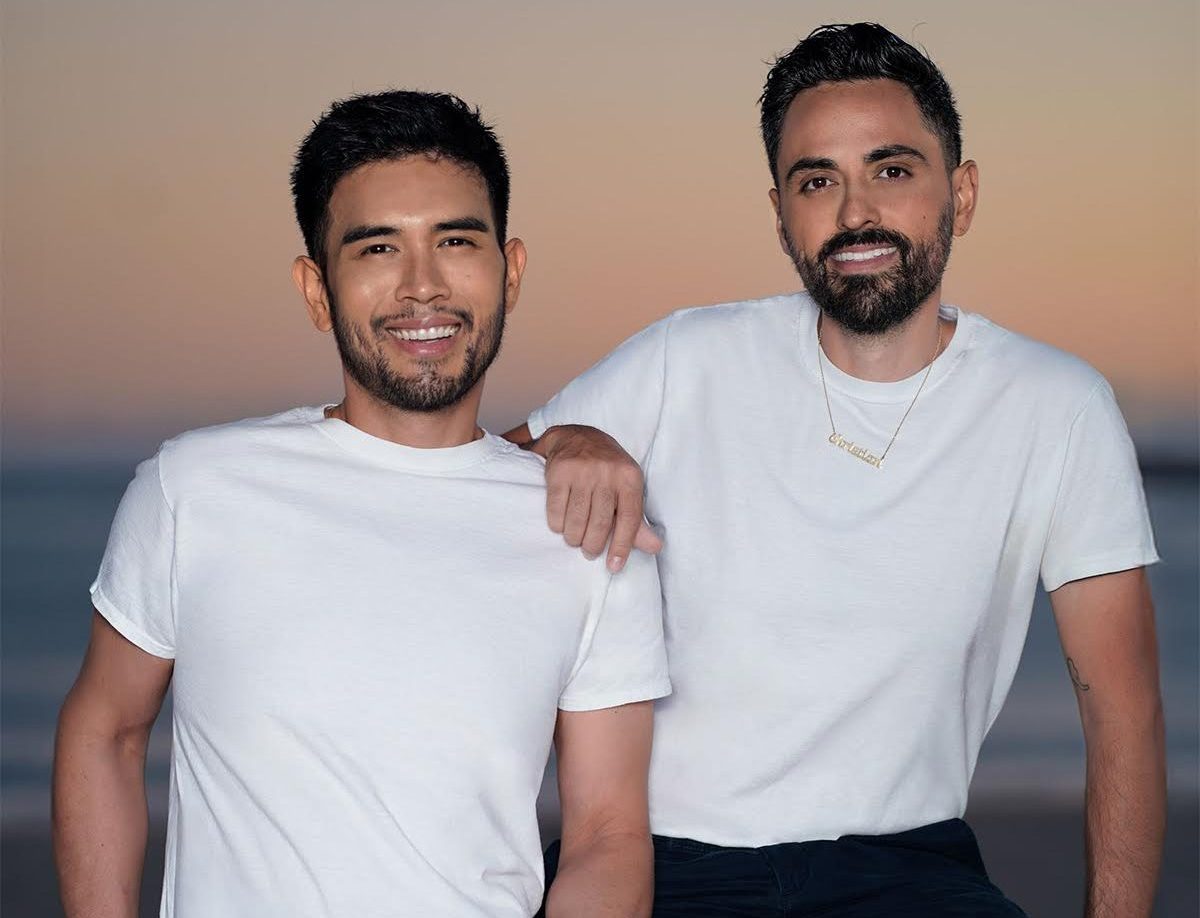
As Black Friday nudges consumers toward the trenches of Amazon, Here & Always stands in warm contrast – a slow, intentional marketplace built from heritage and heart. Founded by Zion Liu and Christian Leon, two queer, first-gen creators who couldn’t find a place that reflected their own identities or the makers that they admire, the brand was birthed from a simple desire: to gift beautifully wrapped, meaningful objects made by real hands and rooted in real stories. What began Liu and Leon’s love of gifting and design quickly evolved into a purpose-driven platform that uplifts queer, immigrant, independent, and allied artisans while reimagining what modern, values-led commerce looks like.
What ignited your inspiration to start an artisan marketplace, and when did you first realize it could grow into a business?
We built Here & Always because we could not find a place where we could gift beautifully wrapped, intentional pieces made by hands and hearts that reflected our own. Queer, first-gen, immigrant, independent, and allied makers all in one place, in one easy experience. So we set out to build it.
The funny part is that it did not start as “let’s build a marketplace.” Zion has always dreamed of a Candy Spelling–level gift-wrapping room, and I am the person who goes way too hard for holidays and gifting. We are both obsessed with home, renovation, and timeless design, so we knew whatever we did together would live in that world of objects and beauty.
Last year we left corporate life to build something with purpose. The first idea was simple: wrapping paper and packaging that reflected the diaspora of LGBTQ+ life, chosen family, and our family roots. The plan was to sell on an existing marketplace and keep it moving.
Then we saw how those platforms actually work, how they profit even when small brands do not, and how quickly major retailers were rolling back DEI and treating “support” as seasonal marketing. That was the turning point. Here & Always stopped being a single product and became a home: a marketplace built by us, for us, where value flows back to makers and the communities they come from, and where the person behind the work is never erased. That is when we knew it could and should be a real business.
Eighty percent of your founding brands are LGBTQ+-owned. Why was queer representation essential to the DNA of Here & Always?
Queer representation is essential because it is our reality. We are queer, and the people who shaped our taste, our sense of home, and our idea of beauty have always been queer, too. For decades, queer makers have set the tone for culture, but they are rarely the ones who benefit when their ideas go mainstream.
At Here & Always, that had to change. Most of our founding brands are LGBTQ+-owned, and alongside them are our allies from immigrant, Black, Brown, and Asian communities who share these same values. Representation is not a seasonal campaign for us; it is the foundation of our marketplace. Diversity is not the side story; it is the core. Structuring the business this way lets us redirect money, visibility, and long-term opportunity back to the communities that have always been quietly leading the way.
Your brand is rooted in heritage, queerness, and community. How have your personal identities influenced the aesthetic or themes of your brand?
Our aesthetic really started at home. Long before Here & Always, we were renovating and restoring homes after we’d worked our day jobs. Our last project before this brand came to life was a midcentury house we restored stud by stud, doing a lot of the work ourselves. We’ve also never been fast-commerce consumers; we would rather save for one beautiful object than buy five disposable ones. Everything we brought home had to feel timeless, well-made, and built to last for years. That lens is baked into the brand.
Layered on top of that is who we are: queer, children of immigrants, raised in Los Angeles. We grew up around altars, candles, plastic-covered sofas, crowded tables, and objects that carried huge emotional weight. Those memories show up in Here & Always as “everyday luxuries” that feel a little sacred: candles, matchboxes, keepsakes, and home pieces that are meant to anchor a space, not just decorate it. The result is an aesthetic that feels like a lived-in shrine, clean and design-forward, but full of story, heritage, and a sense of community you can actually feel when you hold the objects.
Let’s talk challenges. What are some of the biggest obstacles you’ve faced as a small business owner, and how did you come out the other side?
Taste vs Values. We refused to choose between design and thoughtful sourcing. That meant more research, more conversations with artisans, and saying “not yet” to products that were almost right.
Craft vs Margin. Reusable keepsake packaging, recycled materials, and small-batch production don’t automatically play nice with startup math. We quickly learned to redesign, simplify where needed, and remove anything that didn’t add meaning along the way.
Infrastructure vs Story. We’re a marketplace, not a single-SKU brand. That meant building all the tech/ops (Shopify stack, fulfillment logic, product data, reviews) while writing a story that could hold many voices and still sound uniquely like us.
If you could collaborate with any artist, company, or creative, who would it be and why?
Because Here & Always is built around multiple brands, it never feels quite right to single out a “dream” collaborator without making others feel lesser by omission. In many ways, we are already collaborating with our dream partners: the artisans and studios who trusted us early and whose work shapes the soul of the marketplace.
More broadly, our ideal collaborators are people and institutions who treat objects as portals, not just products, and anyone who cares as much about story and community impact as they do about design. If a collaboration helps us pour more resources back into makers and the communities we love, then that is the kind of “dream project” we are excited to say yes to.
How has the cultural and political climate around queer and immigrant communities shaped your mission?
Being queer-founded and LA-based is our foundation. Our identities and origins inform everything we do. We have learned that visibility matters, that luxury does not have to exclude queer, BIPOC, immigrant, or allied communities, and that home can be a sanctuary of authenticity instead of a place where you shrink yourself.
Los Angeles is a city of reinvention and layers. It reminds us daily that culture is not homogeneous, that style and substance can coexist. Against a backdrop where social and political pressure on marginalized identities is very real, we are not interested in building only as a reaction to harm. We are building for what is possible: a marketplace where queerness or diversity is not a search filter but part of the fabric, where the makers we uplift reflect a wide spectrum of identities and experiences, and where “good taste” is not coded for a select few.
That climate also makes the work feel like a responsibility. Being rooted in LA means engaging with community, supporting local artisans while holding a global perspective, and aiming for a ripple effect—job creation, visibility, and a more inclusive idea of luxury. For us, it means every object that ships from Here & Always carries the imprint of someone who did not have to leave their identity behind to make something beautiful. That matters now more than ever.
Do you feel small businesses have a responsibility to take a stand on social issues, or is it best to stay neutral?
We do not believe there is a single rule every small business has to follow. Safety, resources, and context all matter. But we also know that for many of us, especially queer- and immigrant-founded brands, “neutrality” is not really neutral; it often defaults to the status quo.
For Here & Always, our fight is the same fight as the communities we come from, so we chose to build our values into the structure of the business instead of only into statements. We take an activism through craft approach: beauty and design come first, and then there is this “nice surprise” that your purchase is supporting small-batch artisans, queer and BIPOC makers, and giveback initiatives.
We would rather invite people in than lecture them. A lot of our customers are still learning how predatory big marketplaces and mass retail can be; we were too, until we started building our own. So our role is less about telling everyone what to think and more about creating a different model in practice, and letting people discover that they are part of something bigger than just the object in their cart.
Growing up in Los Angeles as children of immigrants is central to The Purpose Candle Collection. What childhood moment or memory most encapsulates that sentiment or experience for you?
The Purpose Collection is really three chapters from our lives and our co-creator Earthy Corazón’s life. We are all children of Latino immigrants, and you can feel that most clearly in the scent we now call Mezcal Moon. In testing, its working name was “Sunday Cooking With Family,” which is really the core memory.
For us, Sundays in Los Angeles meant gathering with the family for the carne asada. There is a fire growing in the grill, tías and tíos dropping by, cousins running through a too-small apartment or backyard, someone putting on music while the TV hums in the next room. You smell food being prepared, share old stories and make new ones.
Mezcal Moon was built to smell like that, like being held by family, by food, by memory. It is our way of bottling that specific experience of growing up as children of immigrants in LA and turning it into something you can light, wherever you are, when you need to feel that kind of home again.
What does it feel like to see customers resonate with products grounded in queer and immigrant narratives?
We are still at the very beginning, so every order feels personal. Any time someone chooses to spend their money with us, especially in a crowded market, it lands as a real act of trust.
When that choice is for a product rooted in queer and immigrant stories, it feels like a double affirmation: that our communities deserve to be centered, and that there is room in “luxury” for narratives like ours. It is validating and humbling at the same time.
We built Here & Always so people could see themselves, their families, or the people they love reflected back in what they gift and keep. To watch even the first wave of customers respond to that makes all the risk and work of starting feel worth it.
You describe your approach as “regenerative commerce.” In your experience, what does giving back more than you take look like in practice?
For us, “regenerative commerce” is a simple test we put against every decision: does this give back more than it takes, from people, from community, from culture?
In practice, that looks like a few things. On the product side, it means prioritizing small-batch, thoughtfully made objects over disposable trends, and working with artisans who are already trying to tread lighter in terms of materials and waste. On the people side, it means structuring our marketplace so makers can actually thrive, respecting their pricing, not squeezing margins to the breaking point, and centering queer, BIPOC, and our allies’ brands instead of treating them as a seasonal feature.
And on the community side, it means building giveback into the model, not just into marketing. A portion of what we do is always pointed back toward impact partners and on-the-ground work. The aspiration is that every product gives back, every purchase uplifts, and every story matters, not just in theory, but in the way money, visibility, and opportunity move through the business.
Why was it important to you that 100% of profits from The Purpose Candle Collection support community partners like Make Good, Inc.?
The Purpose Collection was born to be a proof point of that philosophy. We did not want a “greenwashing” donation model; we wanted a line where the primary job is to fund impact.
Giving 100% of profits from this collection to community partners like Make Good, Inc. was our way of saying: this is what a for-purpose business can look like. We want our entire marketplace, over time, to be using profit for good, not for greed or distant shareholders, and the Purpose Collection is the start of that, a clear line connecting beauty, story, and real-world impact.
Here & Always is described as a movement. Five years from now, what impact do you hope this movement will have on makers, customers, and culture?
We call it a movement because when you shop with Here & Always, you’re not just choosing something beautiful. You’re helping small businesses grow, redistributing economic power, and building a more equitable supply chain one gift at a time. Every product is made by real hands, real people.
Five years from now, we hope that shows up clearly. We want our communities to be thriving, hiring teams, raising their prices with confidence, and feeling supported by a marketplace that protects their value instead of eroding it. We want our customers to expect that the most beautiful objects in their homes can also be the most ethical and story-rich, and to see their purchases as a quiet way of voting for the world they want.
Culturally, the goal is for this model to feel less radical and more like the norm. If in five years it is completely unremarkable that a “luxury” marketplace is queer-founded, values-led, and transparently supporting small-batch artisans, then we will have done our job. Here & Always is our way of redefining commerce as something sustainable and regenerative, where every story and every purchase can move things a little closer to the world we want to live in.
Visit HereandAlways.com
Features
Trump’s shocking White House East Wing amputation — and the painful fallout Americans won’t ignore
Gay Social Secretary Jeremy Bernard on the importance of civility
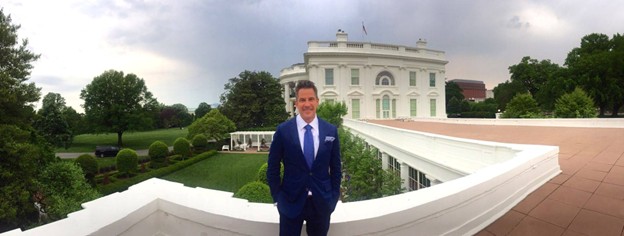
Since Jan. 20, 2025, life in Donald Trump’s divided America has been a series of jaw-dropping split-screen scenarios, flashing at an even faster pace since the resounding anti-Trump, pro-affordability Democratic electoral victories on Nov. 4. But while the weeks before Thanksgiving have injected hope that the No Kings marches, the rule of law, and the 2026 midterms will uphold democracy, Trump’s violently oriented MAGA and Christian National base and his committed Project 2025 backers continue remaking the federal government and fighting the culture wars.

Luxuriating in his own narcissism, Trump ordered the clandestine demolition of the East Wing on Oct. 23 to make way for his 90,000 square foot ballroom. He apparently didn’t care about the national shock at the brutal amputation of America’s beloved cultural arm that balanced the hard political arm of the People’s House.
“This isn’t a real estate deal. This is a living, breathing building. It actually hurts, as a citizen. It’s us. It’s our home. This doesn’t belong to anybody except the blood, the sweat and the tears of every president,” new Washington, DC resident Roseanne Siegel told NPR.
“For historians and for Americans who love their history, this is a big blow,” said ABC News presidential historian Mark Updegrove.
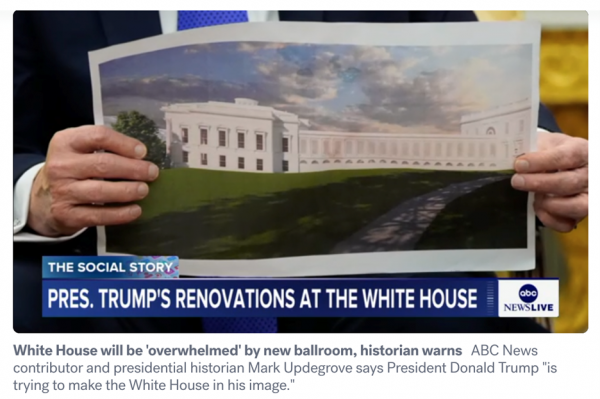
According to an Oct. 30 poll from the Washington Post, ABC News, and Ipsos, 56% of respondents disagreed with Trump’s move while 28% favored it. An earlier Yahoo/YouGov poll found 61% of respondents rejected Trump’s ballroom plan while 25% supported it.
Trump lied. “It won’t interfere with the current building,” Trump said last July about his ballroom plans. “It will be near it, but not touching it. And pays total respect to the existing building, which I’m the biggest fan of. It’s my favorite,” “He was dishonest about his intent in terms of we’re not going to touch anything, like it’s going to be close, but not touching,” Kevin Wade, a 52-year-old tech tourist from Texas, told Reuters. “And then now we’re completely demolishing it.”
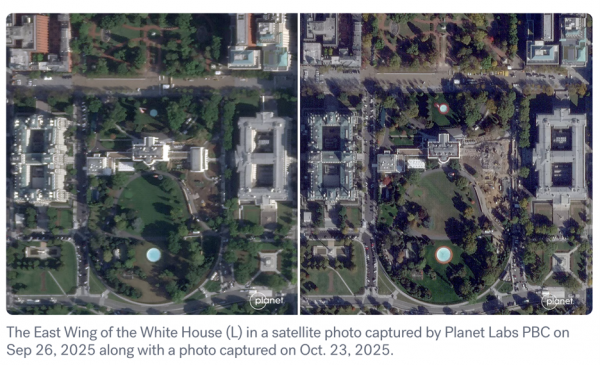
The East Wing emptiness is now a tourist attraction, a PTSD imprint that – with the rapid developments leading up to Thanksgiving – may inspire a turning point in Trump’s presidency.
On Tuesday, Nov. 18, after a 43-day government shutdown to avoid this moment, the House of Representatives voted 471-1 to compel the Justice Department to release all files on convicted child sex offender Jeffrey Epstein.

Meanwhile at the White House, Trump gleefully hosted Saudi Arabia’s crown prince Mohammed bin Salman (MBS) – who US intelligence believes approved the gruesome 2018 murder of Washington Post columnist Jamal Khashoggi. The president scolded ABC News journalist Mary Bruce for embarrassing “guest” MBS with “a horrible, insubordinate” question about Khashoggi’s murder. “Whether you like [Khashoggi] or didn’t like him, things happen.”
In Bob Woodward’s 2020 book, Rage, Trump reportedly bragged about shielding MBS: “I saved his ass,” getting Congress “to leave him alone.”
Meanwhile, after the House vote, Epstein survivors huddled at a news conference, holding up photos of themselves as teenagers and young women, asking if Trump is innocent, what is he hiding? Why won’t he release the files now? Suddenly, thrilled survivors learned that the Senate had unanimously passed the Epstein Files Transparency Act and sent it to Trump for his signature.
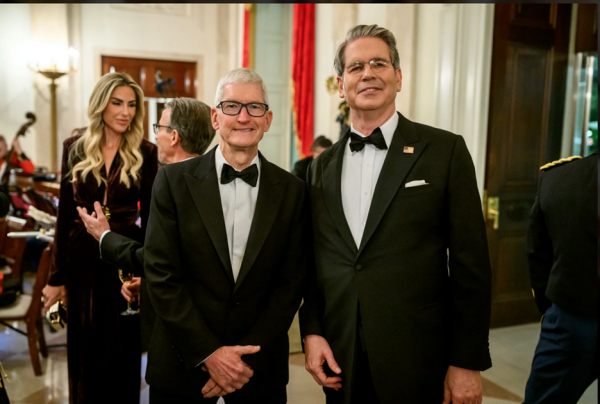
Cut to Trump hosting a black-tie dinner for MBS with lots of rich men who do business with the Saudis. The next morning, he announced that he had signed the Epstein bill, with a 30-day deadline.
“It was a remarkable turn of events for what was once a far-fetched effort,” AP reported. “Trump did a sharp U-turn on the files once it became clear that congressional action was inevitable.”
Trump needed a distraction.
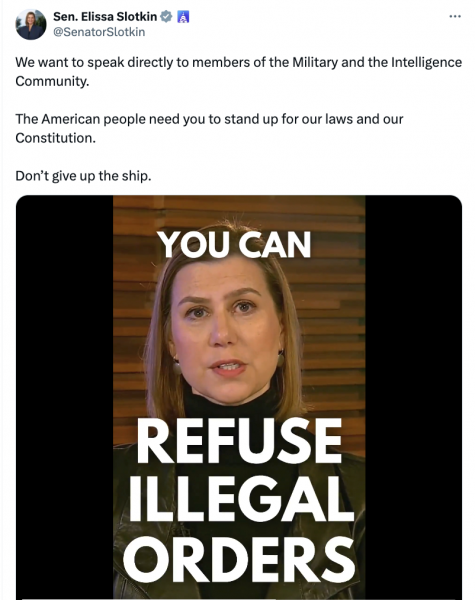
Early Tuesday morning, Nov. 18, Democratic Sen. Elissa Slotkin posted a 90-second video on her X account calling on U.S. servicemembers to not obey unlawful orders.
“The American people need you to stand up for our laws and our Constitution,” said Slotkin with five other fellow military veterans – Arizona Sen. Mark Kelly, and Reps. Jason Crow, Chris Deluzio, Maggie Goodlander, and Chrissy Houlahan. “Don’t give up the ship.”
The Uniform Code of Military Justice says troops who disobey a direct order will be punished. But servicemembers and officers also have an obligation to reject any order they deem is unlawful, a reference to the “I was only following orders” Nazi defense during the Nuremberg trials.
There is cause for concern. In his first term, Trump asked about shooting unarmed civilians protesting the murder of George Floyd. In his second term, Trump has threatened to use the Insurrection Act to deploy troops, “unleashed” police, federalized National Guard, and masked and violent ICE and Border Patrol agents in American cities.
“The president was enraged,” Trump’s 1st term Defense Secretary Mark T. Esper told NPR. “We reached that point in the conversation where he looked frankly at [Joint Chiefs of Staff] Gen. [Mark] Milley and said, ‘Can’t you just shoot them, just shoot them in the legs or something?’ … It was a suggestion and a formal question. And we were just all taken aback at that moment as this issue just hung very heavily in the air.”
Trump found his distraction on Thursday, Nov. 20, reposting a Washington Examiner story about the Democratic lawmakers’ video, adding that it was “really bad, and Dangerous to our Country. Their words cannot be allowed to stand. SEDITIOUS BEHAVIOR FROM TRAITORS!!! LOCK THEM UP???” In another post he said it was “SEDITIOUS BEHAVIOR, punishable by DEATH.”
Trump also reposted a @P78 comment: “HANG THEM GEORGE WASHINGTON WOULD !!” Bomb and death threats against the Democratic vets “surged”. Senate Democratic Leader Chuck Schumer said Trump was ‘lighting a match in a country soaked with political gasoline.’”
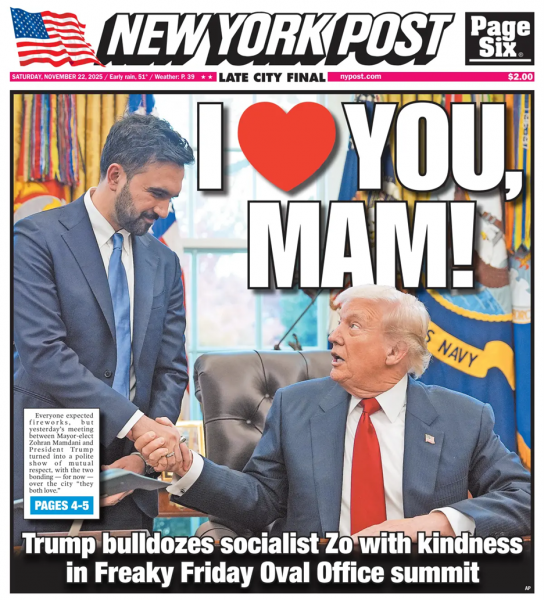
Cut to Friday. 34-year-old New York Mayor-elect Zohran Mamdani met with Trump, who had vilified the Democratic Socialist. But inexplicably, the meeting turned into an Oval Office lovefest, with an almost giddy Trump, 79, saying it was “OK” that Mamdani had called him a fascist. He promised to help the city.
That night, longtime Trump and MAGA loyalist Rep. Marjorie Taylor Greene announced she’s resigning from Congress, effective Jan. 5, 2026.
Greene criticized Trump over “America First” and health insurance policies but a major split occurred when she sided with Epstein survivors over him. Trump called her a “traitor” and vowed to back a primary challenger.
“Loyalty should be a two-way street,” Greene said in her 10-minute video. “I refuse to be a battered wife hoping it all goes away and gets better.”
No one knows what’s coming next.
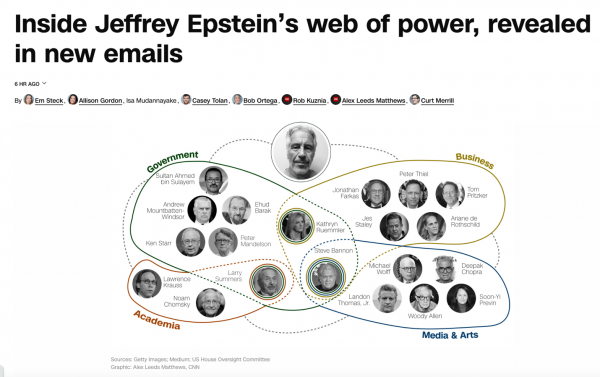
But for the LGBTQ+ community, there are other important split screens amid Project 2025 erasure – such as out California Rep. Robert Garcia’s key role as ranking member of the House Oversight Committee focused on transparency and justice for Epstein survivors.
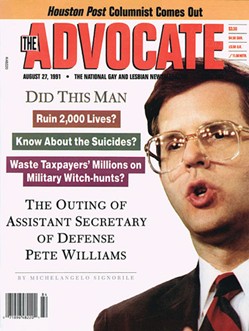
And while Trump was threatening Democratic lawmakers with death on Thursday, Pete Williams, a former NBC News correspondent and press secretary for Vice President Dick Cheney, spoke at Cheney’s funeral at the National Cathedral. Williams told the mostly old-fashioned Republicans how he offered to resign in 1991 when The Advocate was about to out him as gay. Cheney – who loved his semi-out lesbian daughter Mary – said no and checked on him after the story was published. During the horrific AIDS crisis in the early 1990s, ANGLE (Access Now for Lesbian and Gay Equality) fundraised and worked to elect pro-gay politicians. In 1991, longtime gay politico David Mixner introduced ANGLE to his friend, Arkansas Gov. Bill Clinton, whom the group helped elect as president.
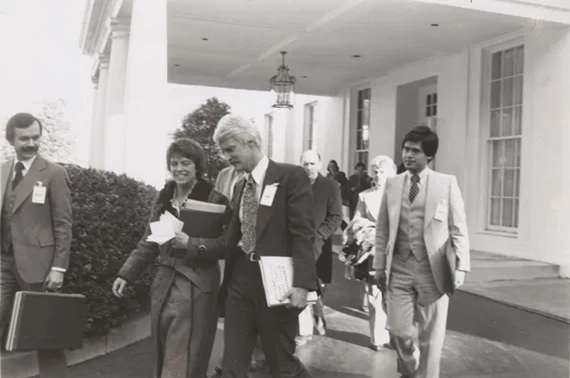
Gay people were not welcome at the White House until Clinton, other than one historic visit on March 26, 1977. Decades later, when ANGLE’s Jeremy Bernard was being interviewed by First Lady Michelle Obama for the job of Social Secretary, he recalled how difficult it was to get through the East Wing visitors’ entrance during Clinton’s administration.
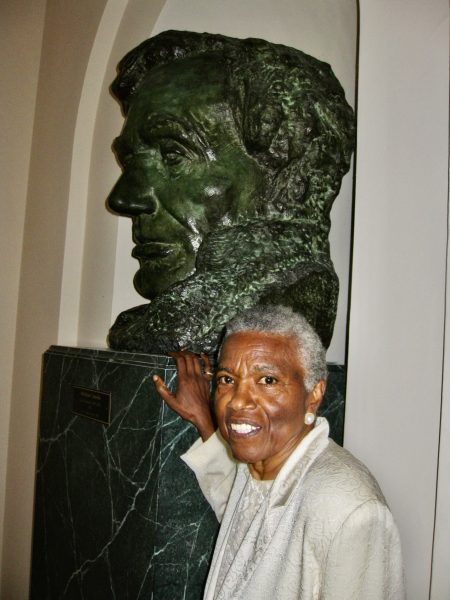
“I said to Mrs. Obama, ‘It takes a lot to get in these doors. And I think it’s very important for people to feel very welcomed,’” Jeremy says during a recent conversation.
The First Lady agreed and “wanted to make sure as many people that never had been to the White House and never thought they would be, got the experience to do it.”
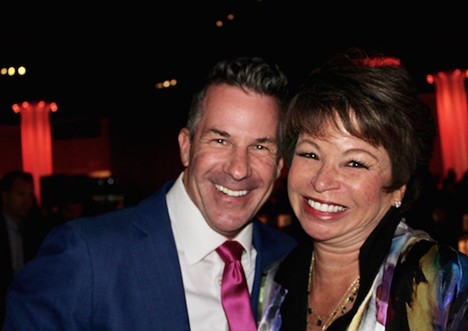
Jeremy worked for Obama’s presidential campaign in 2008, then as White House Liaison to the National Endowment for the Humanities before serving as Senior Advisor to the US Ambassador to France. On Feb. 25, 2011, he became the first male and first openly gay person to serve as Social Secretary.
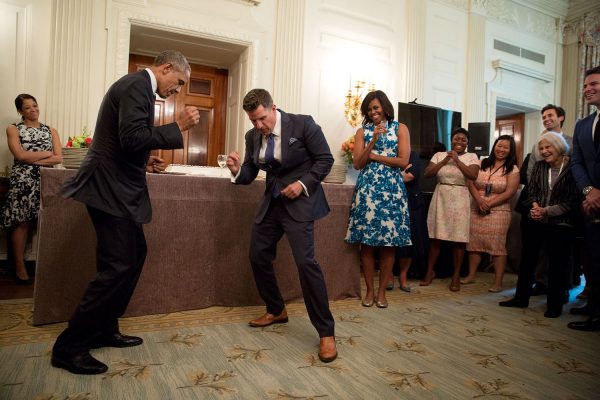
“Jeremy shares our vision for the White House as the People’s House, one that celebrates our history and culture in dynamic and inclusive ways. We look forward to Jeremy continuing to showcase America’s arts and culture to our nation and the world through the many events at the White House,” President Obama said in a press release.
“My office was in the East Wing, and I had what I thought was the best office. I looked over toward the South Lawn, but I also had the roof of the East Colonnade below me. I had a window that actually would open like a door, and you could walk out onto the roof as if it was a patio,” Jeremy recalls, noting that he was warned to call the Secret Service before going out to avoid getting shot.
“I was so shocked,” Jeremy says about the East Wing being demolished. “When I first heard there were bulldozers, I was like, well, what is it they’re knocking down from it?” – finding out later, “the whole thing” was gone.
He felt “some self-sorrow” and “numb” remembering his office. “It really is a part of history, not just for those of us that worked there, but for virtually everyone – whether you were there for a state dinner, a holiday party, or a reception for St. Patrick’s Day, LGBT celebration – whatever it was, everyone came through the East Wing.”
California Gov. Gavin Newsom said it well, Jeremy says. “Compared to what ICE is doing and all that, it may not rank up there, but it’s symbolic of what’s happened in our country.”
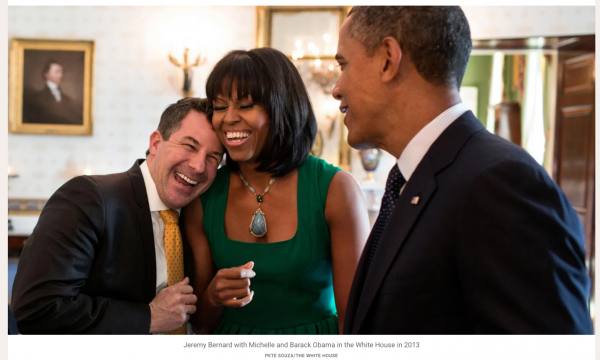
First Lady Michelle Obama said it well, too. “We always felt it was the people’s house,” she told CBS “The Late Show” host Stephen Colbert. “I am confused by what are our norms? What are our standards? What are our traditions? I just feel like, what is important to us as a nation anymore? Because I’m lost.”
And, Obama continued, “I hope that more Americans feel lost in a way that they want to be found again, because it’s up to us to find what we’re losing.”
“The West Wing was work — sometimes it was sadness, it was problems. It was the guts of the White House,” she said. “The East Wing was where you felt light.”
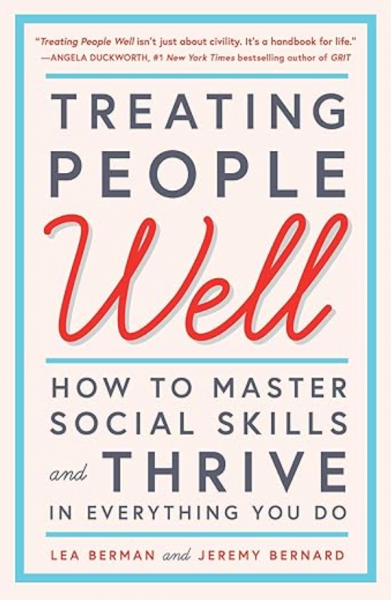
Jeremy and Lea Berman, Social Secretary in the George W. Bush White House, have some suggestions in their book “Treating People Well,” subtitled “How to Master Social Skills and Thrive in Everything You Do.”
“It was important to us to see that despite our differences in how we viewed policy, Lea and I and Lea’s husband – who is an operative in the Republican Party – were very close,” Jeremy says.
“I think about what this must be like for kids,” Jeremy says. “We always looked at these presidents as a certain type of person.”
But now people hear Trump say, “’I hate my enemies. I want revenge.’ What is that teaching kids?” Jeremy asks. “The President of the United States is saying that. I think it’s really frightening. We can’t let that stand.
“I think we’ve got to go back to the way we were brought up about how you treat other people,” Jeremy says. “It’s really important that we focus on the more positive characteristics of human beings…. Most communities are very different and we celebrate that. But you can only celebrate it with civility.”
Karen Ocamb is a veteran LGBTQ+ journalist and former news editor for the Los Angeles Blade. This article was originally posted on her Substack LGBTQ+ Freedom Fighters. Her extended conversation with Jeremy Bernard – who talks more about the East Wing, ANGLE and the Obamas – is embedded in the post.
Features
A blazing champion: Los Angeles LGBT Center’s Terra Russell-Slavin is leading this generation of queer activism
Russell-Slavin grew up advocating for domestic violence survivors as a teen in Texas. Today, they continue to empower the LGBTQ+ lens in their social justice work.

At 16, Terra Russell-Slavin began doing volunteer work around domestic violence when they met someone whose silhouette still lingers in their memory. It was a woman whose abusive husband was held in high esteem in their Texan town, and this sense of helplessness they felt — and the helplessness they imagined this woman was experiencing — continues to impact them. “It was a reminder of how we don’t know what’s happening behind closed doors,” Russell-Slavin told the Blade. “That has always stuck with me.”
Throughout college and eventually law school, they became a fierce advocate regarding domestic violence and campus-related sexual violence. Having grown up with that searing vision and with the politics of their hometown, they were aware of the importance of reproductive freedom and gender-based violence from an early age. “I think just growing up in Texas, there was such an assault on bodily autonomy,” said Russell-Slavin, detailing a pervasive cycle of harm that also intersected with racism and anti-LGBTQ+ beliefs.
Today, Russell-Slavin serves as the Los Angeles LGBT Center’s chief strategy officer, developing models for action and plans of response against federal attacks on LGBTQ+ rights. Even as a young college student, they honed in on the power of their voice and their ability to fight back. At Pitzer College, they worked to rewrite the campus’s sexual assault policy. At law school, they stood in defiance to the threat of military presence at school and stood up proudly as an LGBTQ+ person for the first time.
Over the years, they’ve fought for the safety of domestic violence survivors, namely victims of LGBTQ+ partner violence. In 2013, they were a leading voice in securing federal non-discrimination provisions based on sexual orientation and gender identity. They’ve written extensively about the intersections of domestic violence and queerness, and continue to advocate for resources and protections for LGBTQ+ community members.
Earlier this month, Russell-Slavin was awarded the Triumph Award from the California Partnership to End Domestic Violence, honoring their work in building a “blueprint” of advocacy for LGBTQ+ survivors of domestic violence. The Blade sat down with Russell-Slavin to discuss the metamorphosis of their advocacy through the years, and how this is shaping a hard but hopeful path forward in the fight for LGBTQ+ rights.
Can you tell me more about how your advocacy took shape during college and law school? How did this all intertwine with your own coming out journey?
Law school was the first time I really was able to be my full self and embrace myself as a queer person. It made my life so much richer and full, and I think I was able to become such a better advocate.
In college, I had done all this work around campus sexual violence, and that had led to the rewriting of the sexual assault policy. But I kind of came out towards the end of that, and it was hard. College was hard. I was kind of constantly challenging the systems. And I think by the time I got to law school, I felt more affirmed in my identity, and just more clear on my purpose.
Once I came out, it was like, “Oh, of course.” People just assumed I’d been out for like a decade [when] really I came out the year before.
I remember actually standing up in a governance meeting of faculty, staff, and students at the law school, and it was about the Solomon Amendment. It was back in 2002 when the U.S., under the Bush administration, was requiring schools to allow the military to recruit on campus. It’s actually very symbiotic with what is going on right now.
Law schools folded, and so we were having this meeting. I got up to talk about it, and it was this moment of being like: Oh my god. I just got in front of all these people self-identifying as queer. [It was also the] moment where my advocacy shifted from not just gender-based violence work, but also the intersection with LGBTQ advocacy. I started really integrating the LGBTQ lens into my broader social justice work.
Was speaking up and self-identifying as queer at that meeting a moment of fear? Were you overwhelmed? What were you feeling?
I remember being really nervous and just afterwards, being like: “Did I just do that?” Because it wasn’t necessarily pre-planned, but more responding to that conversation and the moment and the sense of urgency, and needing the people who were to understand the sense of urgency. Afterwards, it was a little bit freeing, because once I’d had that, there was no going back in. It reaffirmed [and] re-solidified my social justice legal track and fighting for our rights. It helped propel that path.
To bounce back a bit, can you tell me more about what rewriting your college’s sexual assault policy was like?
It was really hard. I was fighting the administration, and I was also on the student governance committee. As part of that, I really led an effort to rewrite the policy at an early age. We weren’t the first. But [it was about] this active consent model and that silence is not consent. I was having so many people come to me on a very progressive, privileged college campus to tell me about a sexual assault that had happened on campus, and their [own] sexual assault. I was that person that people came to.
There were some pretty big incidents on the campus, and there was a lot of contention. There were lots of student body, school administrator meetings, and I was one of the main leaders who [were] spearheading the change. There were [also] a lot of students on campus who weren’t happy with the change. It was a really hard time. It was one where I got to grow a lot, and I’m deeply appreciative of having that opportunity.
[In] 2013, I got very involved in federal policy around the Violence Against Women Act. I got invited to the White House for the “Not Alone” report, which was about campus sexual violence. It was so full circle to be at the White House a decade after rewriting our policy, which, at the time, they were still using. I was proud of the fact that we were ahead of the curve for the change. [It’s also] cyclical: so many of the things that we were hearing in the news at that time were things we dealt with 15 years earlier.
Where are you currently in terms of your work, your activism and your advocacy? What are the projects that you’re really passionate about these days?
2025 has been a hard year. We lost our house in the fire in Altadena, and I came directly from that into an executive leadership role in the Center. I was out on sabbatical when that happened. When I came back in early February, my main job [was] protecting our organization against federal threats. We’re the largest LGBTQ organization in the country, and it has been an onslaught of federal attacks. So it has been very intense. That’s where I’ve been spending a lot of my time, is [questioning]: how do we respond to federal threats? How do we mobilize locally and at the state level to fill the gaps caused by these federal attacks? How do we stand in coalition as a progressive movement to not lose the country we fought to create?
How are you managing with dealing with the various crises that are happening federally and also having to personally rebuild and take care of yourself and your family in the aftermath of the fire and losing your home?
I will say I’m very fortunate, and that I have an amazing wife who has really held down so much of the rebuilding of our life. There is [also] something about this moment that I think, if you have been embedded in activism, feels like a moment we train for. I think I had early on, a realization that other people weren’t going to be coming in to save us, and that we were those people. So I think that has really created a sense of both responsibility [and[ an understanding that this isn’t a one month fight, but a longterm kind of ground game.
With this long fight ahead, what is the best way for people to join and mobilize together with the Center and with the work that you’re doing?
One aspect of my portfolio is overseeing our policy and community mobilization teams, and we have an amazing mobilization effort. We ask people to join our policy newsletter, and we’ve rallied people to do phone banks to save Medicaid. We’ve rallied people to show up at CHLA and fight the closure of transgender affirming clinics for adolescents.
We had more than 150,000 emails sent to state legislators to support [our] pro-trans advocacy package. So, I think that is the way we are really hoping people will engage, and we really want more people to engage leading up to 2026. Because this next election is going to be incredibly important to ensure that LGBTQ voices are visible, are seen, are heard and responded to.
You’ve taken on so many different roles within the Center. Through those shifts and transformations, have you seen a personal impact in terms of your approach towards activism and advocacy? How is that shaping where you’re heading in the years ahead?
I started my career working with hundreds of LGBTQ survivors. To this day, [that] informs my work. And I work closely with the teams that still do that work directly. I also am one of those people who always gets calls from the community, and I’m like: “Here’s how you’re connected to services. I got you.”
It’s interesting because I think I’ve gone from doing very direct work to doing policy work to kind of doing everything. And I think I’ve actually been able to come back and think more clearly about where I am best used. Because we need all of us in the fight. And we need to maximize people. I needed to really hone in on what [it is] that I can contribute. Right now, for me, it is bigger picture strategy, policy, advocacy response, and helping us fight back in this moment of real, intense vitriol.
Kristie Song is a California Local News Fellow placed with the Los Angeles Blade. The California Local News Fellowship is a state-funded initiative to support and strengthen local news reporting. Learn more about it at fellowships.journalism.berkeley.edu/cafellows.
-

 Arts & Entertainment5 days ago
Arts & Entertainment5 days ago2026 Best of LGBTQ LA Finalist Voting
-

 Commentary5 days ago
Commentary5 days agoWhen optics matter more than harm: BAFTA, BBC, and editing solidarity while letting slurs slide on through
-

 California5 days ago
California5 days agoExperts discuss pathways forward as anti-trans violence continues to rise
-

 a&e features5 days ago
a&e features5 days agoRevry Co-Founder Damian Pelliccione on why we need ‘King of Drag’
-

 LGBTQ+ Youth Mental Health3 days ago
LGBTQ+ Youth Mental Health3 days agoFor queer youth, LGBTQ+ scholarships affirm their visibility and sense of possibility
-

 Books4 days ago
Books4 days agoThe social side of self-pleasure: Artist Jason Wimberly presents his newest book of photography, HOMOSOCIAL
-

 Books5 days ago
Books5 days agoNew book profiles LGBTQ+ Ukrainians, documents war experiences
-

 Obituary3 days ago
Obituary3 days agoAppreciating literature’s gay genius, Michael Silverblatt
-

 a&e features2 days ago
a&e features2 days agoTaylor Tookes wants you to be your own beauty standard
-

 Movies3 days ago
Movies3 days agoMoving doc ‘Come See Me’ is more than Oscar worthy

